#desus discussion
Note
You have excellent taste. Seteth is very Yes.
It was so funny how I slept on him as I was trying to pick a girl that the realization like "WAIT"
honestly I'm glad it happened that way instead of immediate heart eyes bc it's funnier :p
18 notes
·
View notes
Text
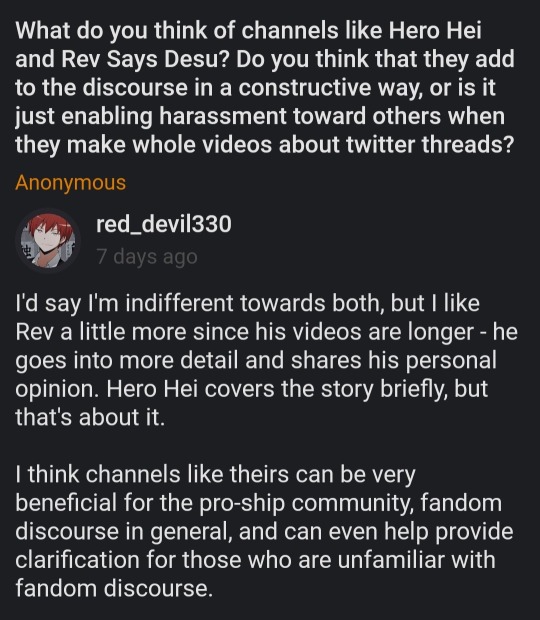

#pro fiction#pro ship#profic#proship#anime#fandom#manga#fanfic#fiction#fanart#hero hei#rev says desu#fandom discourse#fandom ships#fandom discussion
12 notes
·
View notes
Text
YOU’RE ANXIOUS TO HAVE SEX BECAUSE YOU’RE CHUBBY - TEXTING THE LOVE AND DEEPSPACE MEN

Warnings : chubby!reader, slight suggestiveness, body image issues & insecurities, autistic!Zayne, mentions of sex, reader is AFAB!
Genre : hurt/comfort n lots of fluff <3
Additional notes : This was commissioned by one of my lovely mutuals, and I’m so thankful for the opportunity to discuss self-love and portray more diverse body types. Writing this was like therapy to me, seeing as—even when I was heavily muscular—I was a lot bigger than everyone around me. I always worried whether I’d be found as attractive as my thinner friends, but I know my worries would be unfounded with the LaDS men 💗
Commissions are open here!
Tip jar!
Masterlist


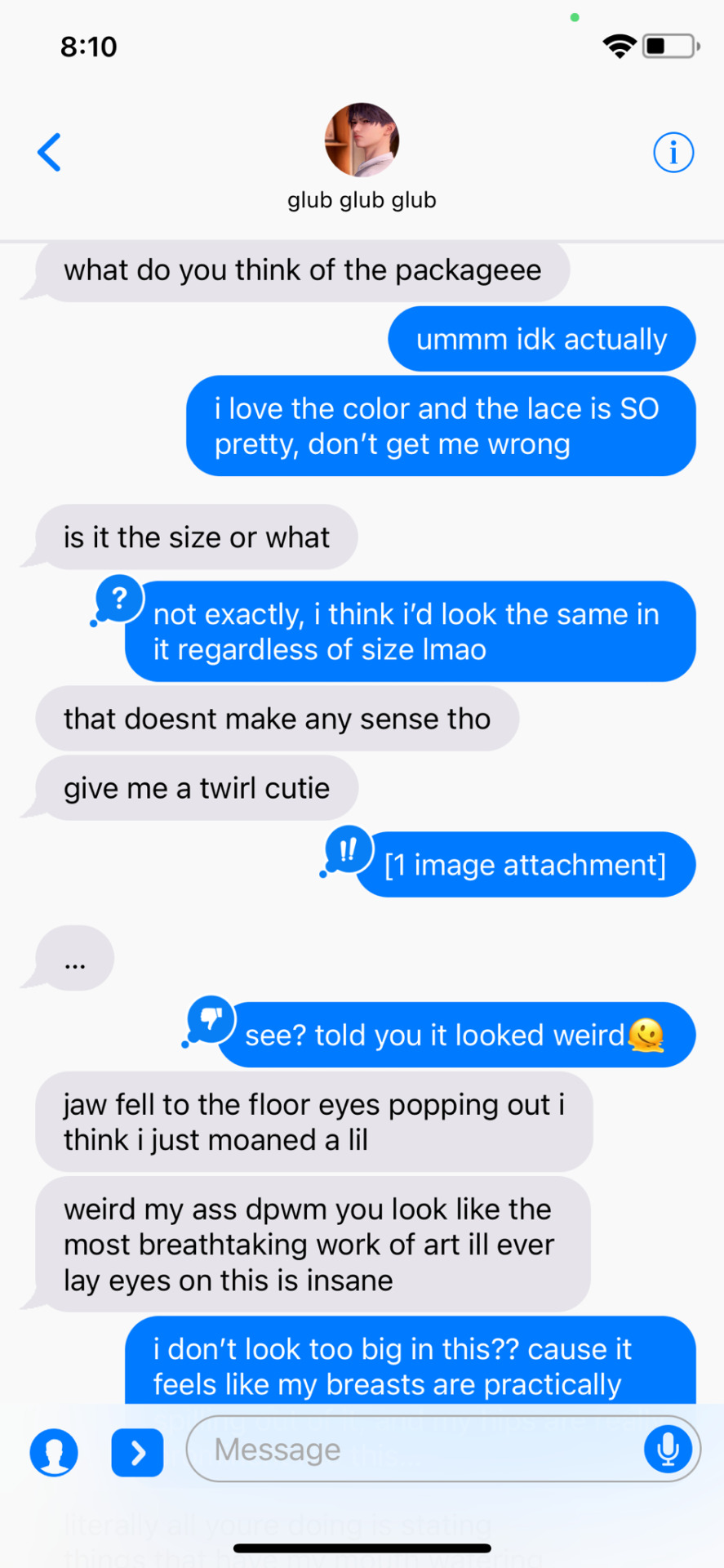



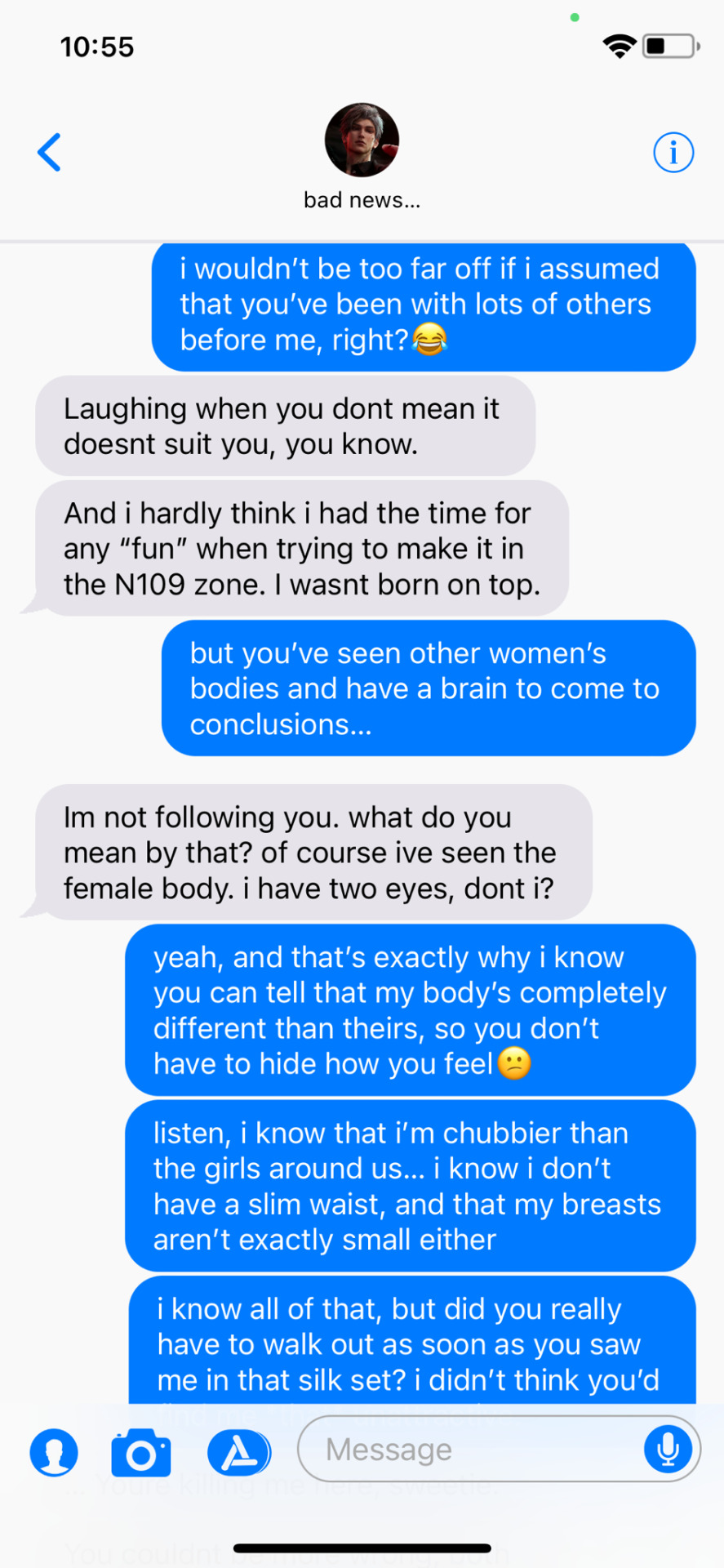
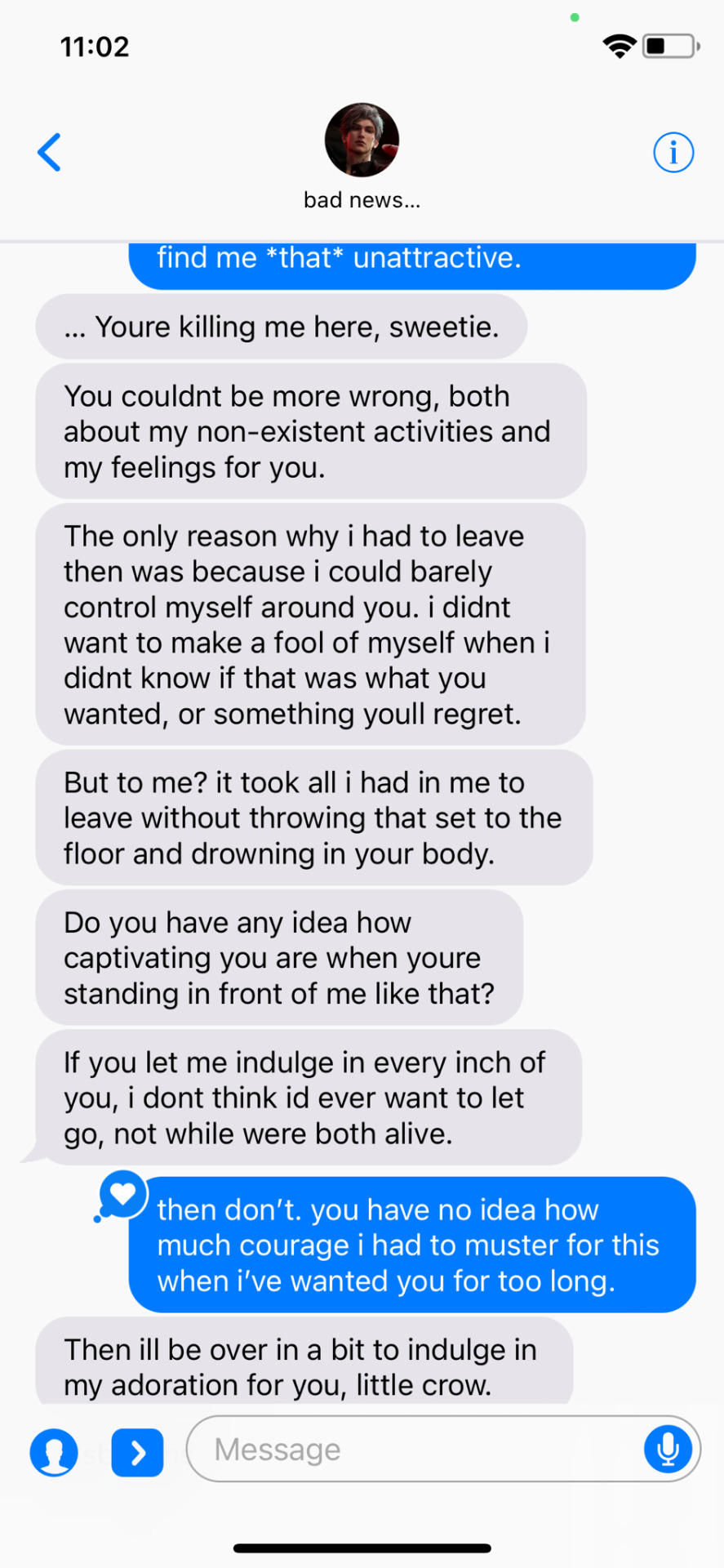
Taglist: @angry-and-yandere @nxx-jordiepord @honestlyjustablog @dawnbreakersgaze @tartartagliaboo @lucis-noctiana @riinari-sa @flurrina @reika-desu @randomidk-123 @tikitsune @cofijelli @roll-of-royces @lemonsupernova @loveyoutodeep @belovedof @lemurianmaster @hawtlineblingz @kalatipunan @eurekazz @bifedebruxa @thescribeswife @mysticangel123 @xenasolos @jvnluvr @dann-acalle @rosariymchapter @rin-sv14 @yololesgo @an-ever-angry-bi @semi-orangeapple @lavanderbliss @myturnwhen @winterlvod @carsonology @deepzombieyouth @respitable @stellisangelicus-world @kvsqkiii @bitchynightmarepost @snoozeflare @spotted-salamander @cindywasneverhere @ladyparamount @sncrly0urs @huntersmoon1 @musiclover2119 @girl-who-lives-in-delusion @milktsukii @fromdeepspace-withlove @hrhmimieucliffe @icedunderwaterroom @ay-chuu @granddearduck @skriblobz @nadinefromwhere @imhere2dosomething @saerotonins @cantescapethevoid @teewritessmth (more in replies!)
Sign up for my taglist here!
#fluff#hurt/comfort#zayne#zayne x reader#zayne love and deepspace#zayne lnds#zayne l&ds#rafayel#rafayel x reader#rafayel love and deepspace#rafayel lnds#rafayel l&ds#xavier#xavier x reader#xavier love and deepspace#xavier lnds#xavier l&ds#sylus#sylus x reader#sylus love and deepspace#sylus lnds#sylus l&ds#texts#texting#smau#love and deepspace#lnds#lads#l&ds#otome
1K notes
·
View notes
Text
Japanese Linguistic Observations in Spy x Family - part 1
This is a post series I've been planning for a while and I've finally had the time to complete part 1! 😃 I may have mentioned here before that I got my B.A. in Japanese/East Asian Studies, and even though I'm not fluent, I know the linguistics of the language fairly well. So I thought it would be fun to examine the interesting aspects of the Japanese version of the SxF manga that aren't reflected in the English translation. It might also be an informative experience for those who don't know any Japanese to learn a bit about the language through SxF! I'll try not to get too technical with the linguistics and keep my explanations at a beginner's level.
-----
Part 1 - Twilight's "honne and tatemae"
One of the main themes in SxF is how many of the characters have secrets they want to hide, so they act a certain way in front of others in order to mask their true selves. Japanese has a word for this phenomena called 本音と建前 ("honne and tatemae").
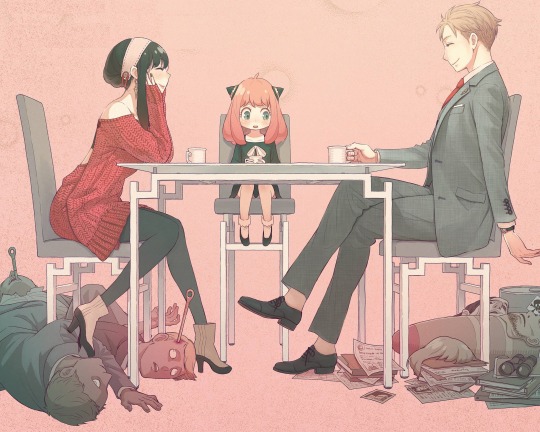
I remember learning about the concept of "honne and tatemae" during my Japanese college studies – a quick google search will yield a lot of publications on the topic and its relation to Japanese culture in particular. While the idea of hiding one's true intentions behind a fake facade can exist anywhere and is not something unique to Japan, it is enough of an occurrence in Japanese culture that there are specific words for it. The Wiki article has a basic but good definition of honne and tatemae, to quote:
A person's honne may be contrary to what is expected by society or what is required according to one's position and circumstances, and they are often kept hidden, except with one's closest friends. Tatemae is what is expected by society and required according to one's position and circumstances, and these may or may not match one's honne. In many cases, tatemae leads to outright telling of lies in order to avoid exposing the true inward feelings.
Sounds very much like the characters in SxF, doesn't it? Twilight especially, because unlike other characters like Yor and Anya, who simply have secrets they need to keep but don't create fake personas for themselves, Twilight does – the cheerful, friendly Loid Forger is a different person from the cold, calculating Twilight after all. Also unlike Yor and Anya, who speak the same way consistently no matter who they're talking to, Twilight uses different speech levels depending on which persona he's using and who he's talking to.
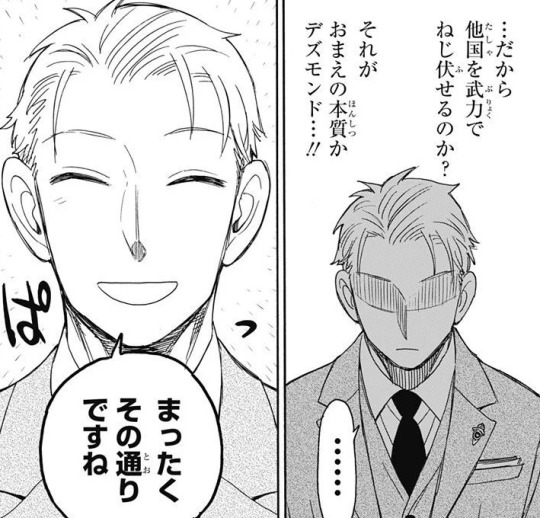
There are many different levels of speech in Japanese, ranging from super formal to totally crude. These speech levels are distinguished mostly by the pronouns the speaker chooses to use for themselves and who they're speaking to, as well as how they choose to conjugate the words they use. For example, 座ってください (suwatte kudasai), 座って (suwatte,) and 座れ (suware) all mean "sit," as in, telling someone to sit down. But the tone being conveyed is different: the first one is polite, the second one is casual, and the last one could be seen as rude if you're not using it with a close friend/family member.
As Twilight, he uses casual speech with the masculine and less polite pronoun 俺 or オレ (ore). This is the speech he uses when talking to a fellow spy like Fiona, and for his own inner thoughts.
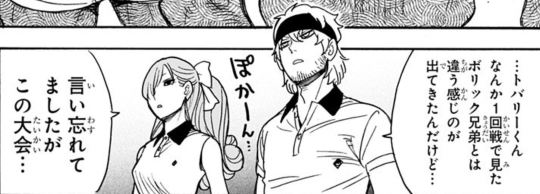
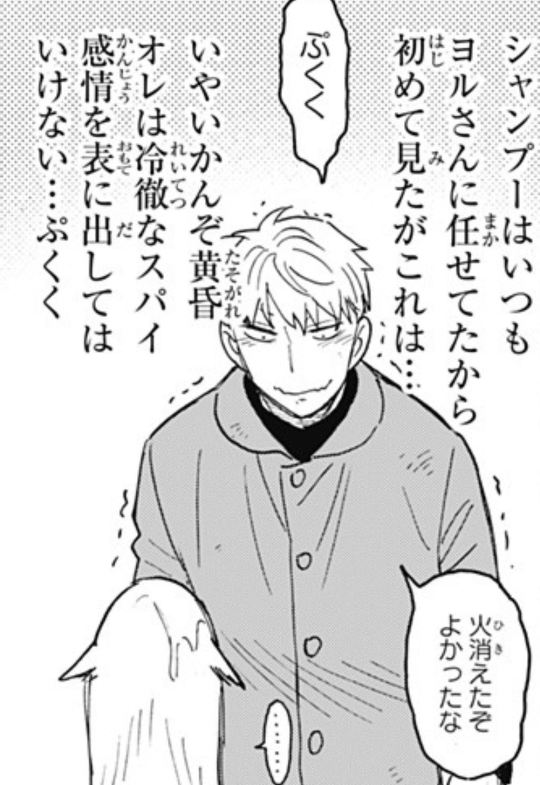
As Loid Forger, he uses the polite 敬語 (keigo) speech, which is basically comprised of using the -ます (-masu) conjugation for verbs and the "to be" verb です (desu). He also uses the pronoun ボク or 僕 (boku), which is the standard male pronoun and more polite than "ore." He uses keigo to address pretty much everyone who doesn't know his true identity. When talking to a higher-up like Sylvia, he'll still use "ore" but will use polite speech instead of casual speech.
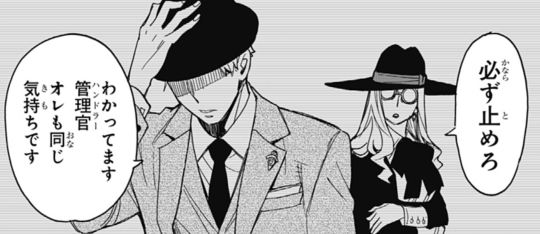
Anya is an exception to this: with her, he uses his most casual speech, the same as he uses with Franky.
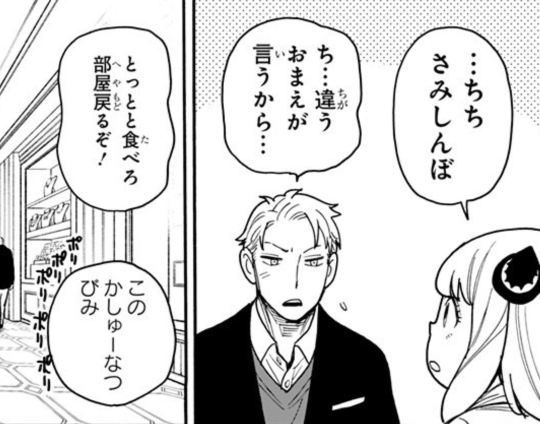
I discussed a bit about this in part 24 of my Twiyor analysis posts, but this could be because Anya is a little kid, so he doesn't feel the need to put on any airs with her (same with Bond, whom he also uses casual speech with).
An interesting side note is that, as a child, Twilight used the pronoun "boku" but then changed to "ore" as soon as he became an adult/soldier.
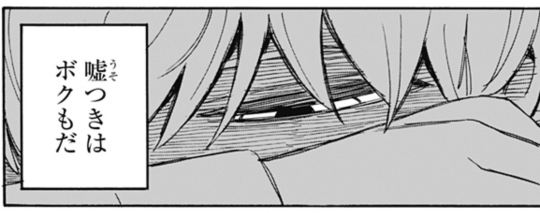
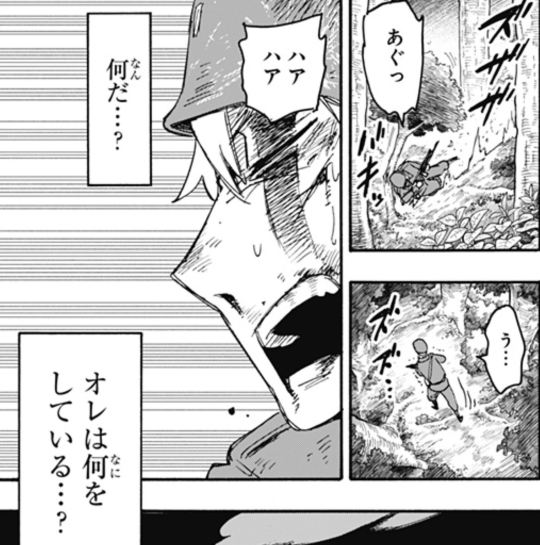
Another aspect of keigo, besides using the more polite forms of pronouns and verb conjugations, is putting the honorific さん (san) after people's names. Twilight does this all the time with Yor, as she does with him. However, he switches to casual speech and drops the "san" part in her name when addressing her in front of people who (supposedly) believe they're a real married couple, such as Yuri and Fiona – because it would be weird for a real couple who have been married for a year to address each other in such a formal way, especially the husband. In the below panel when Fiona visits them, he's calling her "Yor" instead of "Yor-san" and using casual speech instead of keigo.
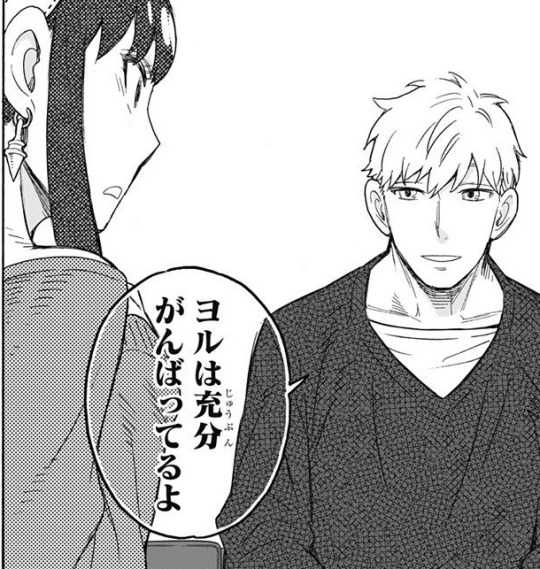
Oddly in these situations, while he uses just "Yor" when addressing her directly, he still calls her "Yor-san" when talking about her. During Yuri's first visit for example, he calls her "Yor-san" when telling Yuri how much Anya loves her (talking to someone about her) but then calls her just "Yor" a few moments later when telling her that he'll clean up the spill (talking to her directly). It's strange to me that he wouldn't just consistently use "Yor" whether he's talking to her or about her in these situations...I'm honestly not sure if he does this intentionally or if he just slips up since he's so used to using "Yor-san" in her presence.
*UPDATE* Thank you to @dentedintheworld-blog for enlightening me with the below reply about this!
"In Japanese, when speaking to your spouse's family about your spouse, you address her/him by attaching "san" her/his name out of respect for her/his family. This is also to show her/his family that you respect your spouse. That's why Loid calls Yor with san when he talks about how much he loves Yor to Yuri."
That definitely makes sense for why Twilight switches between "Yor" and "Yor-san" in these situations.
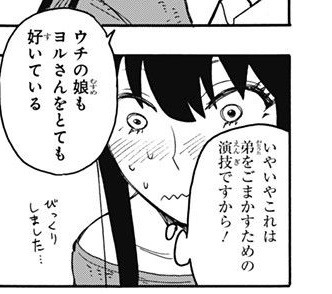
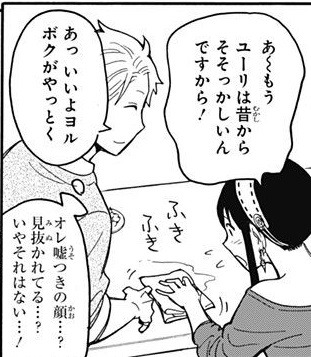
Regardless, this is why the scene in chapter 86 is so significant – when Yor isn't present, there's no reason for him to refer to her as "Yor-san," especially in front of a fellow spy like Fiona who knows he (supposedly) shouldn't have any feelings for her. Yet, even after he just called Yuri by his full name "Yuri Briar" a moment before, he doesn't do the same for Yor and continues to call her "Yor-san" here, much to Fiona's dismay.
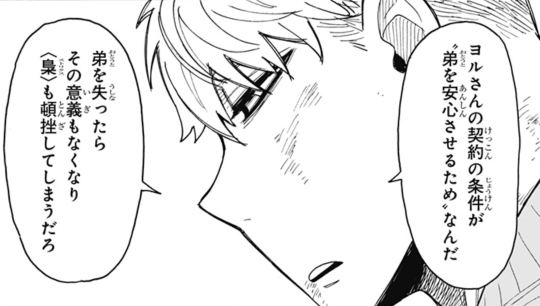
In the same chapter, it's also significant that he uses "ore" when addressing Yor directly in his thoughts. Even though he's not speaking out loud, I believe this is the first time he's speaking directly "to" her as Twilight and/or his true self and not as Loid Forger.
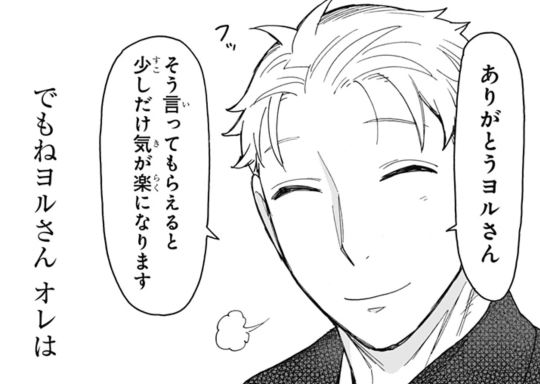
But despite all this, I think that both Loid Forger and Twilight are tatemae…they're both masks to hide the person he truly is. The person who fondly talked about his mother to Yor on the park bench, the person who genuinely expressed gratitude for her sacrifice when leaving the resort island, the person who refused to kill Yuri in a life-or-death struggle because he knew it would hurt her…that's his actual honne. But of course, the ongoing conflict of the series is that he has yet to realize this. He won't even show his honne to his closest friend, Franky. Seems like it mostly comes out in dribs and drabs during his interactions with Yor...no surprise there, lol. The man is certainly a work in progress. When he finally starts letting his "honne" show, I'm curious what form of speech he'll adopt.
-----
Continue to Part 2 ->
#spy x family#sxf#spy family#spyxfamily#loid forger#twiyor#sxf spoilers#sxf manga#sxf manga spoilers#sxf analysis
644 notes
·
View notes
Text
Japanese vs. English Todoroki Family Finale - A 426 Comparison
Just a few days after Horikoshi announced that there were only 5 chapters left, the so-called final chapter for the Todoroki family came out, as always sparking lots of discussion and bringing forth countless questionable takes, followed by the release of the official English translation.
So let’s take a closer look at the Japanese lines, starting with the Todoroki family’s short conversation before going to see Touya:

「来なくて大丈夫って言ったのに!」
「来なくて ; konakute」-> not coming
「大丈夫 ; daijoubu」-> okay; alright
「って ; tte」-> quoting particle (casual of と)
「言った ; itta」-> said
「のに ; noni」-> even though
= “Even though we said it’s okay not to come.”
「それを言うなら貴方たちもよ冬美夏雄」
「それ ; sore」-> that
「を ; o」-> direct object marker
「言う ; iu」-> to say
「なら ; nara」-> that being the case; on the topic of
「貴方たち ; anatatachi」-> you (plural)
「も ; mo」-> also; too
「よ ; yo」-> emphasis particle
「冬美 ; fuyumi」-> Fuyumi
「夏雄 ; natsuo」-> Natsuo
= “On the topic of saying that, you too, Fuyumi, Natsuo.”
What stood out to me here was Rei calling him Natsuo, when usually, everyone else (except Endeavor) calls him Natsu-kun or Natsu. Calling him by the full version of his first name rather than a shortened version might be done to indicate that things have changed, although not necessarily in a negative way. It's more that there has been a shift.
By the way, I am working on a masterpost talking about how the family addresses + refers to each other. Yes, I am going through the entire manga for that (this is a cry for help). Once the manga is finished I will post it (at some point), so look out for that if you’re interested in finding out exactly how many times who gets called what (yes, I am counting and making graphs)!
「お母さんでも…」
「お母さん ; okaasan」-> mom
「でも ; demo」-> but
= “But mom…”

「それを言うならおまえもだ冷」
「それ ; sore」-> that
「を ; o」-> direct object marker
「言う ; iu」-> to say
「なら ; nara」-> that being the case; on the topic of
「おまえ ; omae」-> you
「も ; mo」-> also; too
「だ ; da」-> be
「冷 ; rei」-> Rei
= “On the topic of saying that, you too, Rei.”
I love that he almost fully copies Rei’s phrase here. This is the first of many unoriginal lines that he has in this chapter. It only goes downhill from here.

「義務感で来たんじゃねぇから!皆そうだろ」
「義務感 ; gimukan」-> sense of duty (obligation)
「で ; de」-> with; by
「来た ; kita」-> came
「ん ; n」-> explanatory particle
「じゃねえ ; janee」-> isn’t
「から ; kara」-> because; so (used to change the other person’s thoughts etc.)
「皆 ; mina」-> everyone
「そう ; sou」-> so; that way
「だろ ; daro」-> right?
= “I didn’t come out of a sense of duty! Everyone is that way, right?”
Usually, a second phrase would follow up the kara, but can also be left out when the meaning of that second phrase is implied enough. Since Fuyumi said Shouto didn’t have to come (if he didn’t want to, didn’t feel comfortable etc.) there is an implication that perhaps he only showed up because he felt like that was expected of him. Ending his clarification of “I didn’t come because I felt obligated” with kara “so” the implied follow up would be along the lines of “don’t worry”, which then gets wrapped up suggesting that all of them are showing up not because they feel pressured to do so, but because they want to visit Touya - since they basically just went around in a circle letting each other know they didn’t have to come if they don’t want to.

「会話は可能ですが一日に数分が限界です」
「会話 ; kaiwa」-> conversation
「は ; wa」-> topic marker particle
「可能 ; kanou」-> possible
「です ; desu」-> to be
「が ; ga」-> but
「一日 ; ichi nichi」-> one day
「に ; ni」-> at; in
「数分 ; suufun」-> a few minutes
「が ; ga」-> subject marker particle
「限界 ; genkai」-> limit
「です ; desu」-> to be
= “Conversations are possible, but a few minutes a day is the limit.”
I’m not sure how long Touya has been in here, but this line indicates that the staff members have been talking to him and I’d be curious to know what those conversations were like. What did they talk about? What kind of attitude did he give them? What was his reaction when he first regained consciousness? These are the questions we want answered, but alas, the Todoroki family plot simply isn’t about him. All the way to the bitter end it shall remain focusing on the most underrepresented group of them all: rich middle-aged men.

「緩やかに死へと向かっている…それが今の轟燈矢です」
「緩やかに ; yuruyakani」-> slowly
「死 ; shi」-> death
「へと ; e to」-> towards
「向かっている ; mukatteiru」-> to face; to head toward
「れ ; sore」-> that
「が ; ga」-> subject marker particle
「今 ; ima」-> now; current
「の ; no」-> possessive particle; similar to an apostrophe
「轟燈矢 ; todoroki touya」-> Touya Todoroki
「です ; desu」-> to be
= “Slowly heading towards death… that is the current Touya Todoroki.”
The particle e is a directional particle that can be translated as “toward”. Adding the particle to after it adds an emotional emphasis to the part that follows the to particle as opposed to just stating a fact, there is sympathy in this claim.
As for the claim itself - I know that a lot of people are convinced he is going to die because look! Random nameless character #47AAB7 said so, it must be true! But to be honest, I’m not even going to entertain that thought because despite all the criticism I have for this story, Horikoshi isn’t that bad of a writer. If he had wanted Touya dead, he could’ve easily killed him at the end of the last war. It makes zero sense for him to be saved and then pass away quietly and peacefully in a hospital (or whatever that place is).
Even if we were to say that Shouto managed to save him emotionally, so that counts as a win! It’s kind of a shit win if the only difference is that you now get to die “at peace”, which also could’ve been accomplished on the battlefield. At this point, it’s just inefficient and therefore, him dying at this point is not going to happen.

「........ぞろぞろと」
「ぞろぞろ ; zorozoro」-> in droves; swarming
「と ; to」-> adds emphasis
= “....In droves”
Zorozoro is used to describe several beings (can be humans or animals) that appear or move together like a swarm. This certainly is the first time the entire family is together, so it’s not surprising the rare sight is being pointed out in a joking manner, although he undoubtedly means this in a positive way as it contradicts his prior belief of no one in his family caring about him or missing him.
The fact that, upon first waking up after his coma as a teenager his immediate thought was to return and apologize, and now after ten years he finally gets the chance to talk to them and what is the first thing coming out of his mouth? Calling them a swarm. Forever and always the most relatable character.
「ハハ…観光名所じゃねぇんだよ........」
「ハハ ; haha」-> haha
「観光名所 ; kankoumeisho」-> tourist attraction; sightseeing spot
「じゃねぇ ; janee」-> isn’t
「んだ ; nda」-> explanatory particle
「よ ; yo」-> emphasis particle
= “Haha… It’s not a tourist attraction, right?”
If he was a tourist attraction, Hori better drop the location right now. Please. For research purposes or whatever.

「燈矢」
「燈矢 ; touya」-> Touya
= “Touya.”
「今後の話をしに来たんだ燈矢」
「今後 ; kongo」-> from now on
「の ; no」-> possessive particle; similar to an apostrophe
「話 ; hanashi」-> talk, conversation
「を ; o」-> direct object marker
「しに来た ; shi ni kita」-> came to do sth
「んだ ; nda」-> explanatory particle
「燈矢 ; touya」-> Touya
= “I came to talk about the future, Touya.”
Kongo literally means “after now” or in other words, the future.

「俺はヒーローを引退するよ」
「俺 ; ore」-> I
「は ; wa」-> topic marker particle
「ヒーロー ; hiirou」-> hero
「を ; o」-> direct object marker
「引退する ; intai suru」-> to retire
「よ ; yo」-> emphasis particle
= “I am retiring from being a Hero.”
He says as though he has a choice. This is also one of those “This could’ve been an email” kinds of lines.

「元より戦いが終わったらそうするつもりだったが
最早自力で立つことすらままならん」
「元より ; moto yori」-> all along; from the first
「戦い ; tatakai」-> war
「が ; ga」-> subject marker particle
「終わったら ; owattara」-> when it ended
「そう ; sou」-> so; that way
「する ; suru」-> to do
「つもり ; tsumori」-> to plan
「だった ; datta」-> was
「が ; ga」-> but
「最早 ; mohaya」-> already; no longer
「自力 ; jiriki」-> one’s own strength
「で ; de」-> with
「立つ ; tatsu」-> to stand
「こと ; koto 」-> nominalizes prior word/phrase
「すら ; sura」-> even
「ままならん ; mama naran」-> beyond one’s control; unable to do as one wishes
= “Since after the first war ended, I decided to do so, but I not I am not even able to stand on my own anymore.”
Mamanaru combines the words mama “as it is; as one likes” and naranai “to be unable to” to create a word that describes that something is beyond one’s control, one is unable to do as they wish or something is not going the way one wants it to. In other words, a great word to sum up Endeavor’s entire life story.
The way he continuously takes over conversations that are supposed to be about the entire family - aka his victims - and makes it about himself while pitying himself - in front of his victims - never fails to impress me. At least he is consistent I guess, but it would have been great to see him actually change in the end. Surely he is done, oh no, nevermind, he keeps talking-

「ヒーローエンデヴァーは焼かれて死んだ
おまえの炎は誰よりも強かった」
「ヒーロー ; hiirou」-> hero
「エンデヴァー ; endevaa」-> Endeavo
「は ; wa」-> topic marker particle
「焼かれて ; yakarete」-> burned
「死んだ ; shinda」-> died
「おまえ ; omae」-> you
「の ; no」-> possessive particle; similar to an apostrophe
「炎 ; honoo」-> flame
「は ; wa」-> topic marker particle
「誰 ; dare」-> anyone
「よりも ; yorimo」-> more than
「強かった ; tsuyokatta」-> was strong
= “The hero Endeavor was burned and died. Your flames were stronger than anyone else’s.”

「そっか ご愁傷様 事が済んでから諂うなよ…卑怯者…」
「そっか ; sokka」-> I see
「ご愁傷様 ; goshuushousama」-> my condolences
「事 ; koto」-> things; matter
「が ; ga」-> subject marker particle
「済んでから」-> after it ended (済む + てから)
「諂う ; hetsurau」-> to flatter; to suck up to; to carry favour
「な ; na」-> na (negative command form)
「よ ; yo」-> emphasis particle
「卑怯者 ; hikyoumono」-> coward
= “I see. My condolences. Don’t suck up to me after it’s over… coward…”
Here is my beef with the official translation: they keep making Touya say the most random words and phrases, but then don’t make him say “don’t curry favour”?? “Don’t be toady”?? “Don’t be toady, Todoroki” would go so hard… wait… you know what… Here’s a little extra from me to you:

Back to business:
「そうだな 燈矢は誰のことをよくわかってる ずっと見てたんだもんな」
「そう ; sou」-> so; that way
「だ ; da」-> be
「な ; na」-> sentence ending particle; used to seek confirmation
「燈矢 ; touya」-> Touya
「は ; wa」-> topic marker particle
「誰 ; dare」-> anyone
「の ; no」-> possessive particle; similar to an apostrophe
「こと ; koto 」-> nominalizes prior word/phrase
「を ; o」-> direct object marker
「よく ; yoku」-> well
「わかってる ; wakatteru」-> to understand
「ずっと ; zutto」-> continuously
「見てた ; miteta」-> was watching
「んだ ; nda」-> explanatory particle
「もん ; mon」-> because; indicates reason
「な ; na」-> sentence ending particle; used to seek confirmation
= “That’s right, isn’t it. You know everyone so well. Because you have been watching continuously.”

「俺に見てほしかったんだもんな
なのに見なかった…」
「俺 ; ore」-> I
「に ; ni」-> at
「見てほしかった ; mitehoshikatta」-> wanted me to look
「んだ ; nda」-> explanatory particle
「もん ; mon」-> because; indicates reason
「な ; na」-> sentence ending particle; used to seek confirmation
「なのに ; nanoni」-> and yet; despite that
「見なかった ; minakatta」-> didn’t look
= “You wanted me to look, right? Despite that I didn’t look…”
If I didn’t know any better I would say this was a conversation with a toddler. I usually like to point out that Horikoshi really nails the sibling experience, but he is also, unfortunately, really good at accurately writing how privileged middle-aged men talk. A mangaka of many talents, but at what cost?

「俺はお父さんの子どもなんだから」
「俺 ; ore」-> I
「は ; wa」-> topic marker particle
「お父さん ; otousan」-> dad
「の ; no」-> possessive particle; similar to an apostrophe
「子ども ; kodomo」-> child
「なんだ ; nanda」-> explanatory particle
「から ; kara」-> because; so
= “Because I am dad’s child.”
「おまえはエンデヴァーじゃない!!」
「おまえ ; omae」-> you
「は ; wa」-> topic marker particle
「エンデヴァー ; endevaa」-> Endeavor
「じゃない ; janai」-> isn’t
= ”You aren’t Endeavor!!”
Yes. That’s why we love him.
「誰が何と言おうと........ おまえの炎(ねつ)は俺のヘルフレイムだ
あの告発映像を毎日見続けている」
「誰 ; dare」-> someone
「が ; ga」-> subject marker particle
「何と ; nanto」-> what
「言うと ; iou to」-> to try to say
「おまえ ; omae」-> you
「の ; no」-> possessive particle; similar to an apostrophe
「炎 ; honoo」-> flames
「ねつ ; netsu」-> heat; rage; mania
「は ; wa」-> topic marker particle
「俺 ; ore」-> I
「の ; no」-> possessive particle; similar to an apostrophe
「ヘルフレイム ; herufureimu」-> Hell Flame
「だ ; da」-> be
「あの ; ano」-> that
「告発 ; kokuhatsu」-> complaint; prosecution
「映像 ; eizou」-> footage
「を ; o」-> direct object marker
「毎日 ; mainichi」-> every day
「見続けている ; mitsuzuketeiru」-> continue to watch
= “Whatever people try to say… Your flames (rage) are my Hellflame. I’ve continuously watched your prosecution video every day.”
This wouldn’t be a translation breakdown if we didn’t have a case of the furigana don’t match the kanji! Essentially what this means is that the furigana - written in brackets - show what the character says out loud, while the kanji shows what the character means. This time, when we get the kanji for flames in the second sentence, the furigana read netsu, which can meat “heat”, but also refer to “rage” or “mania” and since flames are hot, “heat” wouldn’t make it necessary to opt for a different reading, hence Endeavor is saying that the rage of Dabi was, in fact, Endeavor’s Hellflame.
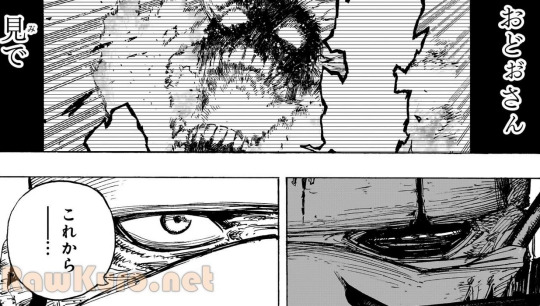
「おどお゙さん見で」
「おどお゙さん ; odoosan」-> dad
「見で ; mide」-> look
= “Dad, look”
You might notice that the words are spelled differently from the normal otousan and mite. Softening the t sounds to a d sound highlights the difficulties he has speaking while being on fire. In addition to the softened t to d, the u also gets changed into an o with dakuten (the two lines on top), which only exist for the sounds that can become softer (t->d, h->b, k->g, s->j), which can’t be done to a vowel like o. In this case, the dakuten suggests that the o is said with emotion and somehow stands out from how it would be said normally.
「これからー」
「これから ; korekara」-> from now on
= “From now on-”

「毎日来る 話をしよう」
「毎日 ; mainichi」-> every day
「来る ; kuru 」-> to come
「話 ; hanashi」-> talk; conversation; chat
「を ; o」-> direct object marker
「しよう ; shiyou」-> let’s do/have
= “I will come every day. Let’s talk.”

「あまりに遅すぎたけれど話そう」
「あまりに; amari ni」-> too much; overly
「遅すぎた ; ososugita」-> was too late
「けれど ; keredo」-> however
「話そう ; hanasou」-> let’s talk
= “I was much too late, but let’s talk.”
Both amari ni and adding -sugiru to the stem of a verb can be translated as “too much” and in combination place an additional emphasis on the verb, in this case, being late, which could be referencing anything from the specific instances he showed up to too late (i.e. when Touya set himself on fire on Sekoto Peak) or in a more general sense him trying to show up as a father too late (the only example would be showing up in the hospital here and the fact he has retired and plans on protecting the family from facing any consequences for all of this, although even that is still more the bare minimum of making up for his mistakes rather than being a father but I doubt he understands the difference).
「心拍数上昇これ以上は負担が」
「心拍数 ; shinpakusuu」-> heart rate
「上昇 ; joushou」-> rising; ascending
「これ以上 ; kore ijou」 - > any more; any further; any longer
「は ; wa」-> topic marker particle
「負担 ; futan」-> burden, load
「が ; ga」-> subject marker particle
= “His heart rate is rising. Any more will (be) a burden.”
The ga would normally be followed by a verb (in this case most likely kakaru = to put), but is being omitted here as the meaning can be understood regardless.
「冷 夏雄 冬美 焦凍が… 残してくれた時間で話そう」
「冷 ; rei」-> Rei
「夏雄 ; natsuo」-> Natsuo
「冬美 ; fuyumi」-> Fuyumi
「焦凍 ; shouto」-> Shouto
「が ; ga」-> subject marker particle
「残してくれた」-> reserved for us (残す+くれる)
「時間 ; jikan」-> time
「で ; de」-> with
「話そう ; hanasou」-> let’s talk
= “Rei, Natsuo, Fuyum. Let’s talk with the time Shouto reserved for us.
Adding -tekureta after nokosu implies that someone did a favor for the speaker. Here, it means that Shouto reserved the time to talk to Touya for them.

「憎いなら…憎いと なんでもいい ぶつけてくれ…!」
「憎い ; nikui」-> hateful
「なら ; nara」-> if
「憎い ; nikui」-> hateful
「と ; to」-> speech particle
「なんでもいい ; nandemo ii」-> anything is fine; it doesn’t matter what
「ぶつけてくれ ; butsuketekure」-> throw it at me
= “If you hate me… hate me. Anything is fine, throw it at me…!!”
「燈矢兄私も…!」
「燈矢兄 ; touya nii」-> Touya-Nii
「私 ; watashi」-> I
「も ; mo」-> also; too
= “Touya-nii, me too…!”
「話したい事たくさんあるの」
「話したい ; hanashitai」-> want to talk
「事 ; koto」-> things
「たくさん ; takusan」-> a lot
「ある ; aru」-> to be
「の ; no」-> explanatory particle
= “There are a lot of things I want to talk about.”
This is about him getting piercings and dying his hair isn’t it. Maybe even taking off his shirt on live TV in front of the entire country. If only we could see that conversation…

「今日は止めにしましょう!!また明日にでも…」
「今日 ; kyou」-> today
「は ; wa」-> topic marker particle
「止めにしましょう , yame ni shimashou」-> let’s stop
「また ; mata」-> again
「明日 ; asu」-> tomorrow
「に ; ni」-> at
「でも ; demo」-> or something
= “Let’s stop for today!! (You can come back) tomorrow or something…”
「最後に一ついいですか 聞きたかったことあるんだ」
「最後 ; saigo」-> final
「に ; ni」-> at
「一つ ; hitotsu」-> one
「いい ; ii」-> good
「です ; desu」-> to be
「か ; ka」-> question marker particle
「聞きたかった」-> wanted to ask
「こと ; koto」-> thing
「ある ; aru」-> to be
「んだ ; nda」-> explanatory particle
= “Can I (ask) one last thing? Because there is one thing I wanted to ask.”
The first panel or first sentence ends in the polite form using desu ka as he is asking the employee for permission to ask one more question. The second panel or sentence, on the other hand, is casual as it ends in da, so without even waiting to receive an answer from the employee, he instantly goes to directly address Touya-nii for this extremely important question.

「燈矢兄 好きな食べ物何?」
「燈矢兄 ; touya nii」-> Touya-Nii
「好きな ; suki」-> to like
「食べ物 ; tabemono」-> food
「何 ; nani」-> what
= “Touya-nii. What’s your favorite food?”
Everybody liked that. It was really great when the spoilers came out and as soon as Shouto said he wanted to ask Touya something everyone instantly knew what the question was going to be. Also a lot of pressure for Touya. Wrong answer and his little brother can pull the plug.

「......体力の限界ですね今日は眠らせてまた…」
「体力 ; tairyoku」-> stamina; endurance
「の ; no」-> possessive particle; similar to an apostrophe
「限界 ; genkai」-> limit
「です ; desu」-> to be
「ね ; ne」-> sentence ending particle; used to seek confirmation
「今日 ; kyou」-> today
「は ; wa」-> topic marker particle
「眠らせて ; nemurasete」-> to let someone sleep
「また ; mata」-> again
= “This is the limit, isn’t it. Let’s let him sleep again for today.”
「蕎麦」
「蕎麦 ; soba」-> soba
= “Soba.”
These lines are always my favorite to break down. It’s not easy translating such complex phrases so please recognize the years of studying it took to be able to perfectly translate this kind of high-level sentence. Thank you.
I can only imagine him going back to his classmates, looking at Bakugo and saying: “You were wrong. It’s soba.”

「おんなじだ」
「おんなじ ; onnaji」-> same
「だ ; da」-> be
= “It’s the same.”
Usually, the word same is written as 同じ and read as onaji. In itself, these two spellings have the same meaning, however, the more standard onaji would be used in the sense of something or a situation being exactly the same, for example attending the same school as someone or facing the same problem. Onnaji, on the other hand, indicates something has very similar properties and is used more in the sense of the same color, taste etc, which is why this spelling has a bit more emotion associated with it.
So Shouto is saying that it’s the same, but he says so with emotion. Rather than stating a fact, them having the same food holds meaning to him.
「これ以上は平行線だ 交わるよ 無理にでも」
「これ以上 ; kore ijou」-> from here on; any further
「は ; wa」-> topic marker particle
「平行線 ; heikousen」-> remaining far apart; not reaching an agreement
「だ ; da」-> be
「交わる ; majiwaru」-> to cross; to mingle with
「よ ; yo」-> emphasis particle
「無理に ; muri ni」-> forcible; forced
「でも ; demo」-> even
= “From here on it’s parallel lines. I will cross, even if by force.”

「焦凍… ごめんな…」
「焦凍 ; shouto」-> Shouto
「ごめん ; gomen」-> I‘m sorry
「な ; na」-> used to say something emotionally
= “Shouto… I’m sorry…”
If only… Shouto had heard this… and they could’ve talked about this… that would be crazy, right? No, why don’t we focus on the main character again, instead of getting a conversation the entire story has been building up to.

「俺はここまでだわ 悪いけど気持ち変わんない 俺はもう付き合わない」
「俺 ; ore」-> I
「は ; wa」-> topic marker particle
「ここ ; koko」-> here
「まで ; made」-> until
「だ ; da」-> be
「わ ; wa」->
「悪い ; warui」-> sorry
「けど ; kedo」-> but
「気持ち ; kimochi」-> feelings
「変わんない ; kawannai」-> unchanged
「俺 ; ore」-> I
「は ; wa」-> topic marker particle
「もう ; mou」-> already
「付き合わない ; tsukiawanai」-> don’t associate with
= “For me it’s (ending) here. I’m sorry, but my feelings haven’t changed. I won’t associate with you anymore.”
The particle wa is used when reflecting one’s view toward a situation after coming to a conclusion. There is a nuance of confidently affirming the phrase or regretting the situation, depending on the tone, which we don’t have here, but this reads more as a confident statement than one of regret, although it might just be a little bit of both.
「ああ」
「ああ ; aa」-> Ah
= “Ah.”
「彼女と籍入れたい 式は挙げない紹介もしない」
「彼女 ; kanojo」-> girlfriend
「と ; to」-> with
「籍入れたい ; seki iretai」-> to get married; to want to have a name entered in the family register
「式 ; shiki」-> (wedding) ceremony
「は ; wa」-> topic marker particle
「挙げない ; agenai」-> to conduct
「紹介 ; shoukai」-> introduction
「も ; mo」-> also
「しない ; shinai」-> won’t do
= “I want to enter the family register with my girlfriend. We won’t conduct a ceremony and I also won’t introduce you.”
Normally, to talk about marriage or getting married you would use the word kekkon (suru). Here, Natsuo specifically uses the term “to enter in the family registry.” While these two words can be used to mean the same thing (= getting married), entering the family registry differs in that one person enters an already existing family registry rather than creating a new one upon marriage, which is why this can also be used for when a child gets adopted by a step-parent or if a child takes on their other parent’s last name after a divorce.
Again, this can just be treated as a synonym for getting married, but it might also be to emphasize this as an act of removing himself from his father rather than an act of love. It surely feels like an odd time to be thinking of marriage, with the current situation not having him in the right mental or emotional state for such a big step to be smart (he already did the whole “cutting my hair during a crisis” so he should follow that with dying his hair or something else that is going to affect his life less than marriage).
Let’s face it: had he said this while they were with Touya, his big bro’s heart monitor would have gone crazy before he would have broken out of that machine to talk some sense into his little brother.
Also, not to insult Natsuo because he is very sweet, but I just have to mention the irony of him getting married as a means to solve his issues when that was also his dad’s first step. It’s obviously different, but still worth pointing out.
「ああ…分かったな」
「ああ ; aa」-> Ah
「分かった ; wakatta」-> understood
「な ; na」-> sentence ending particle; used to seek confirmation
= “Ah, I get it.”
「姉ちゃんは?仕事やめたんだろ?」
「姉ちゃん ; neechan」-> big sister
「は ; wa」-> topic marker particle
「仕事 ; shigoto」-> job
「やめた ; yameta」-> to quit
「ん ; n」-> explanatory particle
「だろ ; daro」-> right
= “What about you, big sis? You left your job, right?”
I do like the symbolism of him standing in the middle of the street, ready to use the crosswalk, while the rest of the family remain on the side of the road, but I am also worried he is going to get hit by a car.

「うんでも 生徒のお母さんが新しい職場紹介してくれてねサポートしてくれるって」
「うん ; un」-> yeah
「でも ; demo」-> but
「生徒 ; seito」-> student
「の ; no」-> possessive particle; similar to an apostrophe
「お母さん ; okaasan」-> mom
「が ; ga」-> subject marker particle
「新しい ; atarashii」-> new
「職場 ; shokuba」-> workplace
「紹介してくれて ; shoukai shitekurete」-> introduced me (as a favor)
「ね ; ne」-> sentence ending particle; used to seek confirmation
「サポートしてくれる ; sapooto shitekureru」-> support (as a favor)
「って ; tte」-> quoting particle (casual of という)
= “Yeah, but the mom of a student introduced me to a new workplace. So she’s being supportive.”
Similar to before, the -tekurete suggests that this introduction as well as the support is seen as a favor.
「........正直責任は果たしたと思う 罰も受けたと思う…もういいんじゃねーの?」
「正直 ; shoujiki」-> honestly; frankly
「責任 ; sekinin」-> duty
「は ; wa」-> topic marker particle
「果たした ; hatashita」-> accomplished; carried out
「と思う ; to omou」-> to think
「罰 ; batsu」-> punishment
「も ; mo」-> too
「受けた ; uketa」-> received
「と思う ; to omou」-> to think
「もういい ; mou ii」-> that’s enough
「ん ; n」-> explanatory particle
「じゃねー ; janee」-> isn’t
「のか ; noka-> question marker particle seeking an explanation
= “Frankly, I think we’ve fulfilled our responsibilities. I think we already received our punishment. That’s enough, isn’t it?”
This line has gotten some negative attention as fan translations have this line directed toward Endeavor, whereas the official English translation has this line be directed toward the entire family. As you can see in the breakdown above, there is no explicit human subject in this sentence to clarify who is being addressed here, in addition to the fact that he has his back turned to us readers with no indication as to who he is looking at.
However, the last person he directly addressed was Fuyumi, who was also the one speaking right before this line. Furthermore, the next line is Endeavor saying that he will ensure to take the blame and whatnot from here on out so that they do not need to face any more consequences for this.
With that being said, to me this reads as him talking to the family, specifically as a response to Fuyumi suggesting that her former student’s mother introducing her to a new workplace and supporting her is somewhat of a favor. While we don’t know exactly why she left her job, there is still a suggestion that this situation has impacted her negatively and that people showing support is somehow worth noting. And yes, Japan has a culture of blaming the entire family when a family member commits a crime, however, Natsuo’s line then seems somewhat frustrated at this, feeling as though they all already faced consequences (like Fuyumi leaving her job), and that they shouldn’t have to face consequences for the rest of their lives, let alone feel overly grateful for any person that still treats them as individuals rather than an accomplice for something they had nothing to do with.
Overall, this line reads more like he wants them to be able to move past this, rather than have this now haunt them after they have already been struggling their whole lives by growing up in the Todoroki household.

「犯した罪の賠償と謝罪を一生をかけて続けていく
見ていなくていい子どもたち(おまえたち)に降りかかる火の粉をできる限り俺が受け止める 生き延びた意味があるとすればそれだけなんだ」
「犯した ; okashita」-> committed
「罪 ; tsumi」-> crime; sin
「の ; no」-> possessive particle; similar to an apostrophe
「賠償 ; baishou」-> compensation; reparations
「と ; to」-> with
「謝罪 ; shazai」-> apology
「を ; o」-> direct object marker
「一生 ; issho」-> whole life
「を ; o」-> direct object marker
「かけて ; kakete」-> make; put out
「続けていく ; tsuzuketeiku 」->to continue from now on (続ける+いく)
「見ていなくて ; mitenakute」-> not looking
「いい ; ii」-> good; okay
「子どもたち ; kodomotachi」-> children
「おまえたち ; omaetachi」-> you (plural)
「に ; ni」-> to
「降りかかる ; furikakaru」-> to happen; to befall
「火の粉 ; hi no ko」-> sparks
「を ; o」-> direct object marker
「できる ; dekiru」-> to be able to
「限り ; kagiri」-> limit; degree
「俺 ; ore」-> I
「が ; ga」-> subject marker particle
「受け止める ; uketomeru」-> to catch; to stop the blow
「生き延びた ; ikinobita」-> survived; lived long
「意味 ; imi」-> meaning
「が ; ga」-> subject marker particle
「ある ; aru」-> to exist
「とすれば ; to sureba」-> then; if so; if
「それだけ ; soredake」-> that much; to that extent; only that
「なんだ ; nanda」-> explanatory particle
= “From here on out I will continue to make reparations and apologize for my committed crimes for my whole life. I will catch as much of the sparks that fall on you kids who don’t have to watch. If there is any meaning in my survival, it is just that.”
Again, he says “you” but means “children”. The miteinakute ii is used to say that “it’s okay not to watch”, in other words he does not expect them to keep in touch with him or anything along those lines.
The -teiku after tsuzukeru is used to imply that something will continue from this moment forward. While he didn't make up for his mistakes, from now on he will.
「........地獄だぞ」
「地獄 ; jigoku」-> hell
「だ ; da」-> be
「ぞ ; zo」-> emphasizes the speaker’s will or opinion; can be inviting to the listener
= “........It’s hell.”

「ああダンスの誘いを受けたんでな」
「ああ ; aa」-> Ah
「ダンス ; dansu」-> dance
「の ; no」-> possessive particle; similar to an apostrophe
「誘い ; sasoi」-> invitation
「を ; o」-> direct object marker
「受けた ; uketa」-> to accept
「んでな ; ndena」-> explanatory particle
= “Ah, I did accept the dance invitation.”

「…初めてだよ お父さんの事 かっこいいって思えたの」
「初めて ; hajimete」-> first time
「だ ; da」-> be
「よ ; yo」-> emphasis particle
「お父さん ; otousan」-> dad
「の ; no」-> possessive particle; similar to an apostrophe
「事 ; koto」-> nominalizes prior word/phrase
「かっこいい ; kakkoii」-> cool
「って思えた ; tte omoeta」-> to seem; to appear
「の ; no」-> explanatory particle
= “It was the first time that you seemed cool.”
Natsuo has called Endeavor by many (disrespectful) names. This is the first time he calls him by the standard/polite term for father. This is not to say that he likes him now. With the whole marriage talk in mind, this feels more like him letting go of his feelings for a second to make a somewhat neutral statement. Neutral in the sense of being able to recognize and view something his dad has done in a positive light rather than letting his feelings completely take over his judgment.
「焦凍は?学校戻るんだろ?」
「焦凍 ; shouto」-> Shouto
「は ; wa」-> topic marker particle
「学校 ; gakkou」-> school
「戻る ; modoru」-> to return to
「ん ; n」-> explanatory particle
「だろ ; daro」-> I think; right?
= “What about you, Shouto? You’re returning to school, right?”
「うん」
「うん ; un」-> yeah
= “Yeah.”
「乗ってけよ姉ちゃんも」
「乗ってけ ; notteke」-> I’ll give you a ride
「よ ; yo」-> emphasis particle
「姉ちゃん ; neechan」-> big sis
「も ; mo」-> also; too
= “I’ll give you a ride. Nee-chan, too.”
「ありがとう」
「ありがとう ; arigatou」-> thanks
= “Thanks.”

「親父 お母さん 俺にはA組(みんな)いるから大丈夫だよ! 俺は自分でなりてえようになれるから!」
「親父 ; oyaji」-> dad
「お母さん ; okaasan」-> mom
「俺 ; ore」-> I
「には ; niwa」-> as for
「A組 ; e gumi」-> class A
「みんな ; minna」-> everyone
「いる ; iru」-> to be
「から ; kara」-> therefore
「大丈夫 ; daijoubu」-> alright
「だ ; da」-> be
「よ ; yo」-> emphasis particle
「俺 ; ore」-> I
「は ; wa」-> topic marker particle
「自分 ; jibun」-> myself
「で ; de」-> with
「なりてえ ; naritee」-> want to become (casual of naritai)
「ようになれる ; you ni nareru」-> to reach the point where; to come to; to begin to
「から ; kara」-> because; so
= “Dad, mom. I’ll be okay because of Class A (everyone). I can reach the point of being what I want to be!”
Just like before we get furigana that differ from the kanji. Shouto says that he will be alright because everyone is there, but he specifically means Class A when he says that.
「地獄でも」
「地獄 ; jigoku」-> hell
「でも ; demo」-> even though
= “Even though it’s hell.”
「おーう早かったな!!大丈夫だったかあ!?」
「おーう ; ou」-> Ooh
「早かった ; hayakatta」-> early
「な ; na」-> sentence ending particle; used to seek confirmation
「大丈夫 ; daijoubu」-> alright
「だった ; datta」-> was
「かあ ; kaa」-> question marker particle
= “Oh, you’re early! Was it alright!?”
「おなかすいた」
「おなかすいた ; onaka suita」-> I’m starving
= “I’m starving.”
「見てる人がいる」
「見てる ; miteru」-> looking
「人 ; hito」-> person
「が ; ga」-> subject marker particle
「いる ; iru」-> to be
= “There is someone who is watching.”
Me. I’m the one watching. But at what cost? The family’s two most used words have got to be “hell” and “to look” . Someone please teach them some more words.
That concludes the Todoroki family interaction in this chapter and supposedly for the story (everyone disliked that). Personally, this does not read as a conclusion so I am going to just treat this as the beginning of the conclusion, instead. And perhaps the final in the sense of the whole family not getting together anymore because Natsuo isn’t going to be around Endeavor anymore.
Personally, my biggest issue with this chapter is the fact that while it’s called final and set up as though the family and we finally get closure by everyone reuniting with Touya, it’s just another episode of self-pitying with a grown-ass man that has still not changed or understood anything despite everything. Yes, he finally managed to talk to Touya, to apologize and acknowledge both Touya’s pain as well as his own accountability in the entire affair. However, the rest of the family could have been left out of this chapter entirely since they said nothing other than “we have lots to talk about” which is obviously a beginning, but I’m sure we all have been waiting patiently to get an actual conversation not just hear them say that they want to talk at a later point, which we then won't ever get to see.
The soba part is amazing, of course, but it could and should have played a bigger role in this chapter.
People have been expressing various opinions in regards to the family’s current situation and their future, though - again - it would be great to see more of that because this chapter only briefly touched on various interesting points and then didn’t explore these points more because if there is one thing this world needs more is privileged people whining about how hard their life is and the many sacrifices they have had to make (= barely facing consequences).
That being said, we’ll see what the final 4 chapters will offer and whether we will see the Todoroki family make another appearance.
And no, Touya won’t die.
220 notes
·
View notes
Note
I've got a question if you wouldn't mind answering!
I saw that the voice actor for Grim commented that Grim always ends his phrases with the word "zo", I was wondering if it had any meaning? Or if maybe it's just something to make his character more unique? Similarly, I've noticed Ruggie tend to use a lot of "su" at the end of his phrases, and I was wondering the same thing, if it had any meaning at all or if it's just supposed to be a character quirk!
Ty for your hard work and don't feel pressured to answer this if you don't want to! 🫶🏻
Hello hello! Thank you very much, you are so kind! ^^
Yes yes, Grim's Sugiyama comments on how difficult Grim's "zo" was for him in his interview (published in vol. 1 of the fanbook).
"Zo" can have a meaning of its own (I liked this explanation on jlptsensei.com, for those who may be curious), but it is generally not used in the way that Grim is using it 🐱 He adds it just to everything!

And verbal ticks like this come up a lot in all kinds of Japanese-language media! Videos games, manga, anime, TV dramas, comedians, etc.
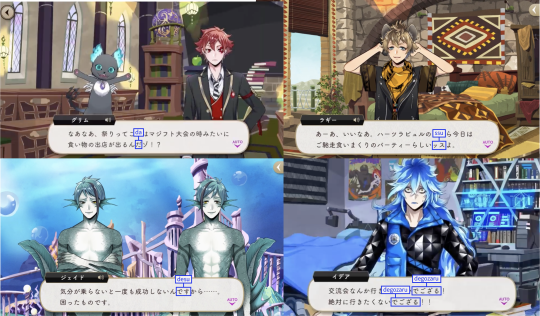
Ruggie's "su" is also kind of a verbal tic, and also has its own meaning:
Discussed in more detail in another post (ref: Idia's "degozaru"), the Japanese language has the word "desu," which has different forms depending on how polite you want to be!
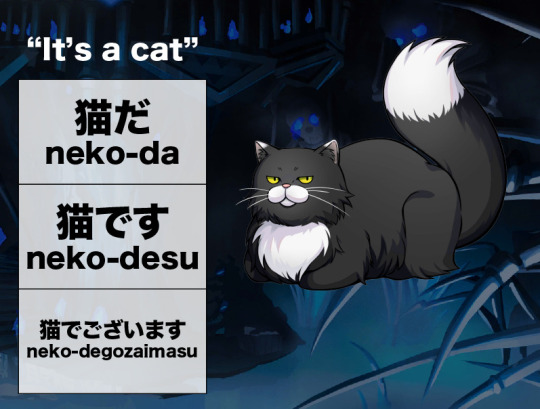
Grim and Jade use the word in two of its more normal (least slang-like) ways, casual for Grim (da) and more polite for Jade (desu).
Ruggie is also using it in a casual way, dropping the "de" part and only using the "su," but it all means the same thing ^^
A verbal tic is even the catalyst of Spectral Soiree!

While not as often as Grim, Malleus is also known to end his sentences in "zo."
He keeps this speaking pattern even during Spectral Soiree, when he is pretending to be possessed by the ghost of an emperor.

But he then slips mid-conversation, saying "zo yo."

Leona noticing this inconsistency starts a domino effect that ultimately compromises Malleus' charade, leading to Malleus' confession (more here).
So verbal tics can be very important! ^^



Crowley's "since I am kind" might also be considered a verbal tic, as it is generally repeated in the exact same way throughout the original game (original-game-to-EN comparison here!).
I think I will add a deep dive into the various speech patterns there are to my TODO list because this post keeps getting longer ww But here are a few pick-ups for right now:



・Idia's use of "degozaru," "-shi," otaku-/net-slang and his stutter are unique to his character.

・Ace will often say "papatto," for getting something done quickly.

・Epel has many things going on with his various forms of speech, and his "kana" might count as a verbal tic?
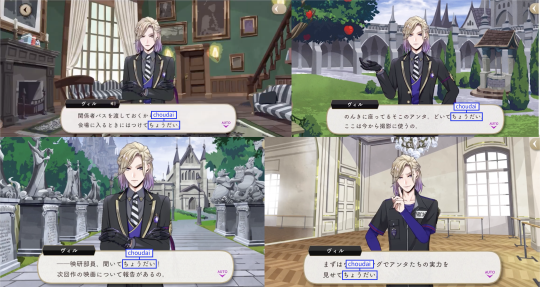
・Vil will often say "choudai" (apologies for the twitter link)
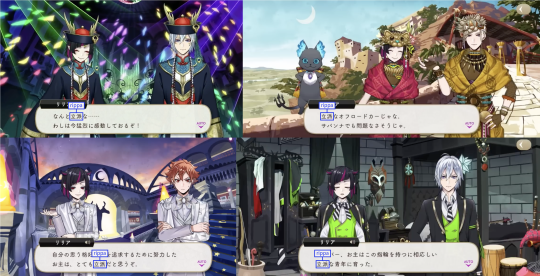
・Lilia will often use the adjective "rippa," which is similar to admirable/splendid/impressive/respectable/etc. in English!



・Riddle will often end questions with "dai"
・A line that Riddle also says before battles, Riddle will often say "ii dokyo ga oari dane," which is something like "to have some nerve." Other characters will say variations on "ii dokyo" (usually Vil and Leona), but this full phrase is unique to Riddle.
・Riddle will also often say "owakari dane," usually to mean "You understand?," as in, "if you don't do as I say, you understand what is going to happen to you, yes?" (re: he is going to behead someone).
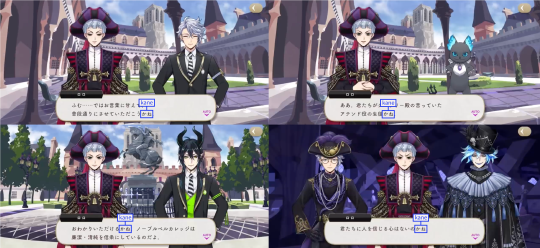
・Maybe my favorite, Rollo will often end his sentences with "kane."
In the way Rollo is using it, it is just another verbal tic, but then there is the Bell of Salvation from the event or 救いの鐘 in Japanese:

Sukui no Kane. "Kane" means bell!
Rollo is ending so many of his sentences with the word "bell" ^^ It is wordplay!

Language is personalized to each and every character in the game, to the point that most of the time (on JP) you can tell which character is speaking before they even enter the room based upon verbal tics and honorifics ^^ It is all very interesting, but unfortunately all very impossible to put across on EN!
165 notes
·
View notes
Note
Hii!! I love ur writings AND UR ART TOO! I have a req 😈
Mizu meeting reader who has heterochromia!

And I miss you on a train, I miss you in the morning
Been missing Japan tons recently so this one’ll be set in modern day Tokyo. Here is a list of translated terms/phrases:
Gouchyui kudasai. Abunai desu kara.. : Please be careful, since it’s dangerous
Keigo: super politeful form of words/grammar.
Gaikokujin: foreigner.
daijoubu desu: It’s okay/I’m fine. In this situation, can also mean: I’m okay (without it)
arigatou gozaimasu: thank you (very much)
samu—!: cold/chilly. it’s actually 寒い (samui), but ppl shorten it in daily conversation by dropping the i.
arigatou: thanks, more familiar.
ohayo: good morning
Summary: A meet-cute in a train car leads to an unlikely friendship that blooms into something more. Discussion of beauty standards in Japan. Insecurities are discussed. Tons of flirting, some heavy petting.
SFW, some nudity but nothing blatantly sexual.
— — —
The first time you saw her, it had been on your morning commute to work. The autumn weather muted that far underground. The wind from departing and arriving trains was the only thing that would create a breeze in the otherwise stagnant air.
She was easy to notice.
Her height forced her to duck under the hanging advertisements with a practiced ease, neck long and slender. A white turtleneck against thin golden chains peeked out from her indigo jacket, spots of sunlight soaked into the snow.
And her eyes—a frozen-over ocean in the middle of the Marunouchu line, an early morning in winter. You breathed and suddenly it was the dead of winter in Sendai and the birds fluttered away up above you.
It’d only been a second, a millisecond, the flutter of a bird’s feather. Then she was gone. Her dark hair a shadowing eclipse against the sharp of her chin, the red of her nose—her eyes.
The train ride went uninterrupted. A jingle, shuffling, and then you were on your way to work. You didn’t quite notice though. Your breath a bleary thing in your ballooned-out chest. Belly wide and searching. An open mouth, fanged and hungry.
The next time you see her, it’s in the dead of night. The last train barely caught. Your mini skirt pressed against your bare thigh and the seat. Make-up dark and hair wild in the nearly empty train car. Winter’s fist had started to close around the Tokyo metropolitan area and the nights became a sharp kind of cold. You felt frozen in your seat.
She’d been sitting there, right across from you in the middle of the row of empty seats. Straight tapered office pants meeting her oxford shoes, that same indigo jacket, golden chains glinting in the glow of the moving lights outside. Her glasses caught in the passing stations, a muted orange that blocked the blue of her eyes.
You stared, entranced. You knew it was rude, but the image she made against the smeared nighttime Ginza scenery made you hold your breath, amazed. The last time you’d seen her, it was too quick. Barely a snapshot of a second. So you drank your fill, greedy and tipsy. The train shifted on the tracks and you both leaned into the bend, your bodies in line.
You distantly wonder if she’s willingly not paying attention to you after the doors automatically open and close following two stops. She hasn’t looked up once from her book, her fingertips a dull pink against the English title.
You want to put them in your mouth—a wild thought that conjures itself in your bleary mind.
When she finally does look up, her eyes greet your own and holds—a challenge. Her dark eyebrows furrow: anger. She observes you closer, focusing on your eyes.
You blush, and quickly look away.
You know she’s seen them: your eyes. People usually narrow their own eyes at you after realizing, and yet—hers shift when you meet them again. There’s no longer a scowl, her eyebrows rise instead, lips parted. A question, a surprise, Intrigue.
Oh, you think, oh.
Your chest buzzes and you wonder if your lipstick is still intact. If your eyeliner hasn’t been smudged. If you still look desirable.
There’s no one else but you two, so you quirk an eyebrow, satisfied to see her flush and look away. The cut of her jaw hidden by her short dark hair.
Her wired earbuds follow, they press against her chin and her hair, and you wonder what she’s listening to. If she can hear your breath quicken, heart rate spiked.
The train doors open at your stop and your stomach flips when she stands as well. Her head ducks underneath an advertisement about train manners, and she waits for you to stumble out first. You feel her hands around the air of your body, the pressure of the feeling against your waist. She doesn’t touch, but you wish she had.
“Gouchyui kudasai. Abunai desu kara..” She mutters down to the ground after you’ve both swiped out of the station. Keigo and all.
Her hair flutters in the tunnel wind, grey eye bags and pink cheekbones that make you wonder what her job is. You settle your miniskirt and nod quickly. The glow of the FamilyMart shines on you both, a play, an experiment.
Yet, as she turns to leave, you feel like it’s gone interrupted. Your story, and hers.
“I’ve! um—I’ve seen you around”
She stops, doesn’t turn around. You continue in clunky Japanese. The alcohol settling deeper in your belly, confidence rising in your throat,
“Are you free for lunch or dinner or..”
She freezes—and you feel like you’ve misread the entire situation, but as she turns back around, she nods. A jerky thing that heats up your face.
Her necklace glints in the nearby streetlights as she puts her Line info into your contacts. Her hand encompasses all of your phone, fingers long and palm wide. You ache at the sight.
“Mizu?” Your fingernails brush the character she’s entered after she hands it back to you: 水. Mizu, mizu mizu.
“Mn. My parent’s..Gaikokujin. Thought it sounded pretty.” She looks embarrassed, her short cut hair brushing her jaw, her ears. Yet, her eyes stay on yours. A lull.
“It is.” You swallow around your words. Greet her with your own gaze, a smile.
She doesn’t trust you to walk home in your stumbling state, so she guides you into the FamilyMart nearby.
She grabs a water bottle for you, a hot milk tea for herself. Like this, in the fluorescent light, she’s taller than the aisles and towers above you. Her nape meets her neck and the hair is shaved there. Short—like a boy’s. You want to touch the skin there, just below it.
She pays despite your assurance that you can pay for yourself.
“‘ts only 120 yen.” is what she says, turns to the cashier and waves away a bag, daijoubu desu, collects the receipt and turns to leave, arigatou gozaimasu. A barely there bow, the receipt crushed in her palm, and then you’re both outside in the softly falling snow.
She opens the bottled water for you and you hiss after you take it: samu—!
She chuckles, watches you take the lip of the bottle into your mouth: tracks your throat as you swallow. You feel like you’re burning up inside your chest and finish half the bottle in one go.
“Do you live far?”
“Just past the next streetlight. I’ll be okay, promise.”
She looks unsure. It’s not windy, but strands of her hair push against her face. She presses it away. Behind her ear that has a stud in the soft flesh of her lobe. You follow the movement in your tipsy state. Watch it glimmer in the night.
“Let’s meet again soon, then.” Her hand gestures to your bare legs, eyes averted and away—flushed, “Stay warm.”
She presses the hot milk tea into your hands. Swaps it out for your water bottle. It sloshes against the plastic when she meets your gaze. She’s inspecting you. Tracing the outline of your face, your eyes. Your fingertips welcome the warmth, and you open your mouth to thank her: arigatou
“Get home safe.” Her hands brush your own, and she grins at the touch, slow and soft.
A taxi’s unoccupied sign blinks on in the dark nearby. The rush of the trains sound behind you, a car drives by.
She leaves then, and you watch her go. Her shoulders sharp in the cold night. The snow falls on you but the unopened milk tea burns and you think of her again and again. Even after you turn and walk away too.
The walk back is slippery and when you get home, your phone sits content in your pocket. You smile, a big happy thing. Her name sits in your mouth, and you think: Mizu, mizu, mizu. As if your lips would forget in the morning.
—
You go out for dinner later in the week.
Mizu is shy. She jokes only after you’ve both ordered a round of sapporo, her flush an insistent thing. Her neck is long and you watch as it reddens through the night. The glow of the shop the only thing keeping your hands to yourself.
The conversation flows steadily. Like two lifelong friends. The banter is easy, and the flirting easier. You notice Mizu’s steady gaze on you and you smile to welcome it. A flower unfurling in the sun.
You both promise to do it again afterwards. Mizu’s hands linger on yours when you leave, and the touch sinks into you, a slow gulp of water against your throat.
It’s breathless and exciting, being with Mizu. She texts you ohayo’s and brushes your hair out of your face, stands close in the train, and slips her hand into yours when she walks you back home after your fifth date. The first night you spend together, her thumb slips against your cheekbones and she smiles,
“You are so beautiful.”
She kisses you and your body and your thighs. She fucks you the way she had promised over texts late at night. Kisses your eyelids afterwards, a love that blooms between you both.
“Did you ever get bullied about it?” She asks one morning.
You’re both naked, the sunshine glinting on the sheets and into the kitchen where you’re making coffee. The question is asked unsure, a train passes by in the distance.
“I did. Not too much, but yeah.”
“Me too.” Mizu shoves on her shirt, a button down that she leaves open, the space between her breasts littered in marks, “Kids can be mean.”
You nod, tilting your head to the side when Mizu comes up behind you and kisses your throat. The muscle in your shoulder. Your back: the bone there.
“You’re stunning.” She whispers. Moves her hands up your body, a warmth that stirs between your legs, “Fuck what anyone says—kids especially.”
You laugh, twisting around to face Mizu. Her eyes meet your own, a clash of colors and you let her gaze win. You tuck your face into her neck and blow a raspberry to the skin there.
“It’s not so bad now. Usually, people just think I forgot to put in my other contact.” Mizu huffs, lets her hands wander lower, “The plus side is that I got a hot girlfriend out of it.”
You pull back and peck Mizu’s unassuming lips. She stutters around the sudden labeling, and you smile to let her know it’s okay. It’s okay.
You spend the day together, a lazy Sunday. And when you see the scene you both make in the bathroom mirror after a shower you flush at it all: Mizu, naked, her eyes boring into you and tracing the lines of your body. And you, the color of your eyes, each a separate hue. Yet, the love inside them the same and as blatant as ever.
“You’re beautiful.” You say, grabbing Mizu and kissing her. Pushing her bangs away from her eyes, hand settling on her back. There’s a freckle there you’d kissed earlier. You press into it.
Mizu chuckles, finds your lips and pulls away to whisper into the opening of your mouth. A secret, a wish, a promise.
You keep every single one.
———
Haha, so I really just miss FamilyMart and affordable food and the stellar Japanese public transportation so here this is. Didn’t specify reader’s eye color so you can imagine whatever colors you want—including your own!
title inspired by about you by the 1975
#blue eye samurai#mizu x reader#mizu blue eye samurai#heterochromia#mizu x fem!reader#modern!au#Tokyo#Japan#I miss Japan and the trains and the food :
183 notes
·
View notes
Text
So I've seen some discussion about the way Mammon talks in 24-11, and how some think Asmo forced Mammon to speak this way while others think it might be because of a issue with the translation. And since I speak some Japanese, I figured I'd break down what's actually going on here
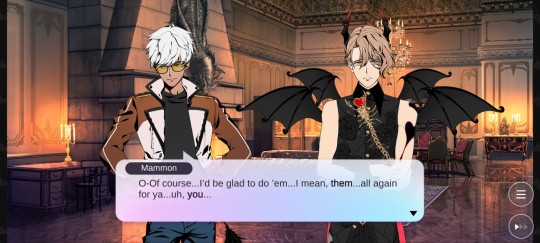
If you don't want to read through the Japanese grammar explanation, just skip to the last section, but for everyone else I'll try to break it all down. Just keep in mind that I'll simplify some things to (hopefully) make it easier to understand for those that don't speak Japanese
Right away, here's the dialogue above in the Japanese version + written in Romaji for those that can't read Japanese:
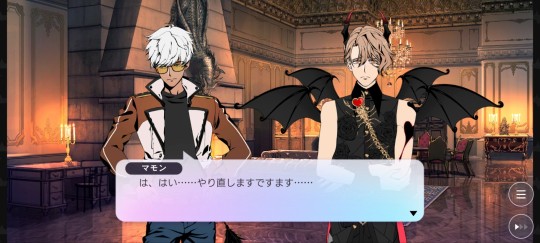

understanding sentence-ending particles
(not really relevant to Mammon's dialogue itself, but I think it'll help make the function of 「です」 ('desu') and 「ます」 ('masu') in the next section a little clearer)
Sentence-ending particles serve to indicate the overall tone a sentence is meant to have. There are a few of them and each one gives the meaning of the sentence a different nuance
The two easiest examples to understand this concept are probably the following:
the 「か」 ('ka') particle
basically just a spoken question mark;
turns any sentence into a proper question
the 「ね」 ('ne') particle
literally functions the same way as 'isn't it'
ちょっと寒い。 ('chotto samui')
-> It's a little cold.
ちょっと寒いか。 ('chotto samui ka')
-> Is it a little cold?
ちょっと寒いね。 ('chotto samui ne')
-> Bit cold, innit? It's a little cold, isn't it?
the auxilary verbs 「です」 ('desu') and 「ます」 ('masu')
Similarly to the sentence-ending particles, these two change the tone of the sentence and are placed at the end. Both make the sentence polite, and depending on what the sentence ends with, you use one or the other. If it ends in a verb, you add 「ます」 ('masu') at the very end, and if it ends in anything else you use 「です」 ('desu')—you cannot use both back to back
Which finally brings us back to Mammon's dialogue

As you can see, he goes a little overboard. Since 「やり直す」 ('yari naosu'; 'to redo') is a verb, the first use of 「ます」 ('masu') is correct, but everything after that is just overkill and wrong but it sounds very cute
(The way Mammon speaks here actually reminds me of how half of my classmates used to speak the first few weeks of uni lol)
But yeah, it's definitely not Asmo forcing Mammon to speak differntly since all of the brothers are talking more politely. And given that they're all under Asmo's charm and serving him, it makes sense that they'd adopt a similar manner of speaking as Barbatos. It's just that Mammon is the King of Casual Speech™, dancing gracefully between 'still acceptable' and 'straight up rude' more or less gracefully at least, so obviously he'd struggle with switching to a more butler-like speech style
It's the same with Beel actually. He's usually the type to just cut straight to the point, which is why he also slightly messed up when speaking politely. To me the original Japanese version reads more like a cute little joke that's in line with both their character, that unfortunately got lost in translation since English just doesn't have an equivalent
#i was part of the other half of the class that kept forgetting to use 'desu' at all sdhfhssdhf#also the way i cackled when i read lucifer using 「かしこまりました」#something about it is just so much funnier than 'as you wish'#obey me#obey me nightbringer#obey me spoilers#obey me nightbringer spoilers#obey me mammon#obey me asmodeus#obey me beelzebub#obey me nightbringer mammon#obey me nightbringer asmodeus#obey me nightbringer beelzebub#my stuff
294 notes
·
View notes
Text
I need my 日本語を話せられない TWST friends (non-Japanese speaking) to know that my buddy who is an L2 Japanese language teacher (with an MA in East Asian Studies) and I (who is an L2 Japanese learner with an MA in Sociolinguistics) have been dying over this colloquial grammatical construction that we keep seeing in the voice lines of History/Flight and Alchemy lessons: 朝から (asa kara)
Neither of us can figure out how to properly translate this construction, and every time TWST adds a new line with it, or we come across a line we hadn't see before, we immediately message one another in our confusion and have a conniption over it. We had questioned whether or not it was an example of "anime dialect", but after finding plenty of examples of it being used on Japanese twitter, we realized that it is definitely a colloquialism that's used in everyday speech.
For discussion purposes, keep in mind 朝 (asa) means "morning" and から (kara) is the particle causing the translation issues.
The thing you have to understand is that in Japanese classrooms and in Japanese grammar books - including Japanese grammar books FOR native speakers the particle construction ____から (kara)____まで(made) functions like "from ___ until ____" in English.
Except that's not how its being used in TWST. The まで portion of the particle construction never shows up in any of the examples that I've pulled from TWST.
Examples include (but are not limited to):
Cater (History): 朝からいい感じ (asa kara ii kanji)
いい = "good"
感じ = "feeling" (like a vibe or emotion)
Official Localization: "Off to a good start today!"
youtube
Cater (History): 朝から頑張らね (asa kara ganbara ne)
頑張らね ≈ "let's do well"
Official Localization: "Early bird gets the worm, I guess."*
*Footnote: While the translation here isn't literal, this line makes me openly question if 朝から is actually a set up for an idiomatic phrase in Japanese but I will discuss more later...
youtube
Jade (History): 朝から元気でそね (asa kara genki desu ne)
元気 = "in good health" or "well"
です= formal, present tense of the closest equivalent of "to be"
ね = equivalent tag is "right?" or "yeah?"
Official Localization: "You have a lot of energy in the morning."**
**Footnote: This localization is just painfully off from the intended meaning? But we're keeping it here to prove a point.
youtube
Malleus (History): 朝から退屈だ
退屈 = Tedium or boredom
だ = informal past tense of です
Official Localization: "It's early, and I'm already bored."
(A fun side note: This exact quote was found verbatim on Japanese twitter when we were searching for language samples.)
youtube
Sebek (Alchemy): 朝から再ないこだな
再ない ≈ not again
再ないこだな ≈ its the same again /its repeating (with a declarative verb conjugation, implying that the audience already understands and agrees)***
***Footnote: I kind of get the sense that he's basically saying "It's another morning and it's the same shit again", but not literally. Because he is clearly using a negative declaration here and the implication of the repetition "from the morning, its the same again" kind of gives me the reading similar to "Not this shit again".
Official Localization: "Someone awoke in a foul mood."
youtube
Additional translator's note: Because the subject is repeatedly dropped from each example here, and the only ones that indicate any inclusion of an outside party are Cater's second example and Jade's example because of the inclusion of the pragmatic tag, I am operating under the assumption that each student is likely speaking about themselves. This creates a bit of conflict in my understanding when compared to the localizations, because the localizers keep making a referential to an outside party ("someone").
You can tell from the official localizations that they are localized in such a way that its seamless for English speakers, but the translations often aren't or can't be literal. The localizers also repeatedly use idiomatic phrases in their translations where contrastingly, the predicate of the sentence (after the time placement) don't necessarily use phrases that I recognize as being used in idiomatic contexts. This creates an issue since we can't use them as a reference for being able to figure out what から does/how it functions in the sentence as a grammatical element that also changes the meaning of the sentence. The closest thing we've been able to guess about the use of から in these lines is that it might mean "From" or "Because of", which we pulled from one of the Grammar Books that she uses to help teach. The chart can be seen here:

But if that's the case, Cater's second line doesn't exactly make sense? Nor does Sebek's line? And for that reason, I have to wonder whether or not 朝から is used as a formulaic set up and if that set up is idiomatic in nature.
Both of us for literal months have been scrounging the internet in hopes that we can find any sort of clue as to how to understand this construction and/or to identify whether or not its specifically a colloquial usage to signify an idiomatic phrase is being used. One of the big flaws though is we haven't exactly been able to find any evidence on sites like Word Reference forums of the use of から in any potentially idiomatic way, and the localizations suggest that it could either be idiomatic or literal. We also haven't found any other site that uses or references から without まで.
At this point, it's entirely possible I'm overthinking it? But I'm genuinely confused and want to better understand it so I can improve my overall Japanese comprehension.
I honestly just wanted to share this because it's been both a fun and also frustrating learning journey, and also because I'm hoping maybe there's another person out here who 日本語と英語を話せまそ that might also recognize or know this construction and helps us understand it better. ^^;
#twst#twisted wonderland#translation#localization#linguistics#colloquialism#Japanese learning#seris talks#朝から is going to be the death of me I swear#Also yes I did in fact sit there and screen record these lessons until I got the exact clip I needed#In this house we provide evidence and cite our sources#L2 learning#Youtube
31 notes
·
View notes
Note
mahiru. 12.
im expecting this to be an answer that requires a read more. go, autism boy, go. talk about mahiru and all the ways people sleep on her character
I LOVE YOU. YOU KNOW ME SO WELL.
right. yeah here we go. i Do have thoughts. on this one.
12. what do you wish would be discussed more often about them in the fandom?
ok. well first off. i think we should just talk about mahiru more in general because i love her. but here is my biggest thought on What Exactly Some People, Especially Not On Milgramblr, Are Sleeping On About Mahiru: there's a lot of talk about her murder case, and that's great, but... i think a lot of the things that really draw me to her as a character and to her case tend to slip by people on account of the way milgram likes to- as kazui shows us in cat- keep it simple, victim and perpetrator. but i think trying to understand her better also gives a better understanding of where exactly things did go wrong in the relationship that put her in milgram.
the rest of this answer where i elaborate more will, in fact, be under a cut because you are right that i have an essay locked and loaded on this and actually this turned into a mahiru analysis/theory post by accident i meant to answer mostly normally but unfortunately i'm not normal about mahiru shiina.
let's talk about this is how to be in love with you. can we talk about this is how to be in love with you? i'm dying to talk about this is how to be in love with you. and god, its english name is a mouthful, i understand why some people just go with calling it ai nan desu yo.
obviously (hopefully) we all know mahiru getting guilty voted over this mv was absolutely fucked and unfair. i'm still mad about it. especially because i think that if you look at this is how to be in love with you (and her interrogation questions from its trial) in particular (as well as some other stuff), it says a lot about mahiru as a person, and in turn about her crime.
it's easy to miss underneath how friendly and cheerful she is with the other prisoners, how she seems like such a social butterfly, but... i don't think mahiru actually had a lot of connections other than her boyfriend, and i think this is a big factor in what happened with him. mahiru... seems lonely. like her life is... very empty. and i don't see people focus in on this fact a lot, despite how her first trial voicelines even say as much:

there's nothing left without him, and at least if she's here she can talk to es and the other prisoners. mahiru's interrogation questions paint a picture of someone who doesn't really have a lot in their life. when asked in t1's interrogation if there's someone she can confide in, mahiru's answer is the lady who works at the beauty parlor she goes to. this doesn't seem like the answer of someone who has close friends to talk to instead, at least to me. like. that's not... you'd think if she had friends she felt she could talk to, she'd have mentioned that here, right? that'd be the place to mention any close friends?
in this is how to be in love with you we see her spending days off at cafes alone, and she tells us about having hobbies that are generally solitary, we see her reading in the mv and interrogation reveals that prior to milgram her hobby was watching dramas. she tells us in interrogation that growing up, she was a sheltered girl. she also appears (taken from this is how to be in love with you) to have recently arrived in tokyo, meaning she may not know a lot of people there and has probably moved away from most of her family (though she does mention attending a relative's wedding).
i think part of the problem is that when mahiru meets her boyfriend... she doesn't appear to have much in the way of anyone else. mahiru is social, mahiru loves talking to people, mahiru doesn't really know how to act without copying others... and her boyfriend is the only person she's close with. she appears to be relying on him for almost all of her social connection.
as i just mentioned, she also has the habit of copying others, incessantly. the infamous "i'd smoke if my lover did too" interrogation answer, and again, the text in this is how to be in love with you...
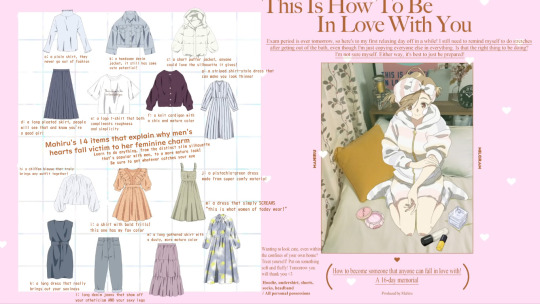
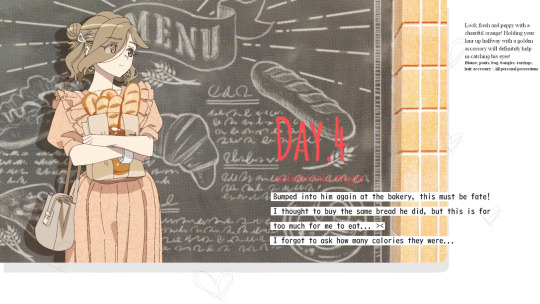
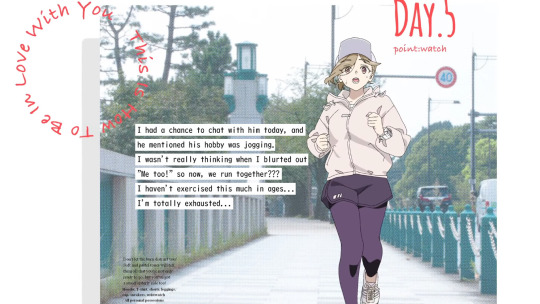
(transcriptions into english from here!)
see the things that jump out here? "even though i'm just copying everyone else in everything. is that the right thing to be doing?", "i thought to buy the same bread he did", "i wasn't really thinking when i blurted out "me too", so now we run together". you can see this in the lyrics too. "i'm going to start relying on you if you're kind to me, so please forgive me!"
i think these are key traits in why her relationship went the way it did. i don't think mahiru is uniquely "toxic" or too needy/clingy in a way that means she can never have a relationship (and god, don't get me started on how i've seen people say this). i think she's obviously a highly social person, and was in a situation where she was relying on one person (assumedly with lower social needs than her) to fulfill all of her need for that. i think she's horribly anxious about losing that connection and having to be alone again, and she doesn't know how to deal with it other than to constantly (and annoyingly, disruptively) ask for reassurance. i think she bases herself on others and ignores her own desires in order to imitate them and/or do what they want, and if her boyfriend also didn't have a particularly strong sense of identity and/or also wasn't the type to stand up for himself, it would be really easy to get sucked into this horrible loop where you're both trying to copy and please each other and now you're both constantly putting aside what you actually like for the other person and neither of you are happy.
except mahiru is happy, or... she thinks she is, because she's happy to give herself up for love. she says as much herself: "we fought sometimes, i was happy to get hurt." but... there's something else in the lyrics, isn't there? "i pretended to be a good girl, i don't want to be "ok"". my take is that mahiru isn't getting what she wants/needs out of the relationship, and knows it on some level. but she isn't going to leave him, either, because she's decided this is true love and also if she did that she'd be alone again. so she hopes something will just change instead, or convinces herself that she is satisfied. but she's not. near the opening of this is how to be in love with you: "i guess we can just say that this feeling is happiness, i can't stop feeling like there's something missing." so she keeps pushing, she keeps trying, and... well. we know how that ends.
so after all this rambling, what's my point, exactly? i don't think either mahiru OR her boyfriend were any sort of perpetrator. nor were either of them a victim. i don't think the relationship fits neatly into that framework, even though milgram judged mahiru a murderer and her boyfriend to be her victim. i think there's a reading that doesn't need any of that: two people who seemed to get along well and have similar interests who got into a relationship, and who were actually incompatible in their deeper needs in a relationship. mahiru clings to this relationship despite this, because she needs it. because she can't be alone again. because having a boyfriend who fails to fulfill what she wants/needs is better than having nothing.
neither of them are bad people, nor (from what we can see and from my opinion on it) did either of them do anything particularly wrong. what makes the most sense to me is a competing access needs sort of situation. mahiru needs reassurance and a lot of attention/interaction (especially from a romantic partner, something she idolizes having because of how special you're supposed to be to each other!), while her boyfriend needs more space than what she's giving him... but mahiru, at least, definitely doesn't want to break up. so eventually, they end up in a situation where he feels there's only one way out.
i think this lens can be supported by what we see in i love you, too! note lyrics like "this can't go on, something's got to give", "why won't you just accept me", "mon-mon-monstrous, cuz i love you so much". and...
here's something else she says in i love you: "i don't need anyone else, as long as i have you." but the truth is... mahiru does need other people. the truth is that one person can't fix the underlying issue that mahiru is desperately lonely and has very few connections in her life. the truth is that it's incredibly unfair to rely on one person to fulfill all of your needs and to desperately insist upon staying in a relationship just to avoid being alone, and mahiru realizes this too late.
so. um. i've never really seen anyone else talk in too much detail about an interpretation of the character/situation like this. i see a lot of "they were both toxic" but i think that's a kind of weak simplification of it, you know? what is "toxic". it's bad, obviously. do we think they're bad people doing bad things, or just that the relationship was bad? is that "toxicity" inherent to them as people, or could things have gone better in a different relationship? are they both "toxic" or are they just both stuck in an incompatible relationship where neither of them are wrong but they are unable to meet each others' needs?
i don't know. it's 4am and i've been writing this for two hours and i'm honestly not sure if it's coherent or not. but to end this here's another footnote of something i cant stand people sleeping on about mahiru: she is so stupid forgiving of literally everything and it kind of kills me and i dont really see anyone else point this out as being a bad thing that could get her really hurt. like. she forgives kotoko for almost killing her and says she doesn't resent anyone for anything. she puts up with anything, as seen by what i mentioned about her desire to stay in the relationship with her boyfriend even though it was obviously not giving her what she needed and it was hurting her too! i think if mahiru had ended up in a relationship with a different guy, it would be entirely possible for her to be in an abusive relationship and refuse to leave it because of this particular tendency. and i don't see this mentioned much. probably because, again... mahiru's framed as a perpetrator. she killed her boyfriend, right? so obviously she's not the one who'd be hurt in a relationship.
ok. i'm done now i promise i am so done with this for real. um. if you read this whole thing thank you. i'm sorry it's so long or if it's incoherent in places. i just have a lot of thoughts about mahiru shiina
#milgram#fuck it im maintagging it. everyone read my long-ass mahiru post. get mahiru'd.#wow a theo original#mahiru shiina#asks#lizard-boot-camp
62 notes
·
View notes
Text
Etie Personality Analysis - Original Japanese vs. English Localization - Fire Emblem Engage
I've received 2 anons in regards to Etie, so I decided to do a full reading and analysis of her support conversation chains!
Even if I've seen her supports translated elsewhere, I'll still add my own commentary to be thorough, and just because I like to talk about FE support conversations that much.
First, I'll cover this anon.

I think the description that Etie speaks more formally, and like an 'ojou' type, in Japanese is pretty accurate.
Here's some notes I took while reading her support conversations (Not going to go into too much detail here, hopefully I describe enough that those without a basic understanding of Japanese can follow along well enough.):
She always ends her sentences with desu and masu. Sometimes even de gozaimasu. (For those who don't know much about the distinct difference between formal and casual Japanese speech, sentences in formal Japanese almost always end with either desu or masu tacked on. Informal Japanese drops them.)
Her 'I pronoun' is atakushi. (For those who don't know much about 'I pronouns' in Japanese, atakushi is not inherently for noblewoman only, but noblewomen tend to use it.)
She ends everyone's name with the suffix san (Equivalent to calling everyone "Miss/ Mrs." or "Mr.").
She ends many of her sentences in wa (わ) - not inherently formal or feminine - but is a common speech trait of noble ladies. Maribelle (from Awakening) is another character that stands out to me as using sentence-ending wa frequently.
She sometimes uses the 'polite' version of a word when one exists, like okata. (Kata is a general word meaning "person." Often used like a pronoun. Adding prefix 'o' makes the word more polite.)
This is not an exhaustive list by any means, but gets the point across.
In conclusion, I agree that Etie speaks more formally in Japanese, but mostly in ways that just don't directly translate into modern English, so something getting lost in translation was inevitable.
In English, there's no equivalent to ending one's sentences with desu and masu. There's no longer a formal and informal "I" pronoun. There's no "sentence endings" in English grammar that quite compare to those in Japanese. Etc., etc.
That being said, the localization could have made other word and voice acting choices to make up for the ENG / JP differences, but I don't think they really did. Characters like Maribelle (from Awakening), and Clair (from Echoes), are identifiable noblewomen pretty quickly based on how they speak in localization.
It's hard to tell exactly what direction the Engage localization staff were going in with Etie without official commentary. Maybe she comes off as more casual on purpose, maybe not.
I hope that all made sense, even to those who don't know much about Japanese! Please let me know if you have any further questions!
-----------
Now, for the 2nd anon!

This anon is much more general, so there's nothing specific to respond to. I'll just lead into my full support analysis here.
In short, Etie really is as much of a workout and muscle building fanatic in the Japanese as she is in the English. She feels like an extreme final evolution of Effie's (from Fates) dedication to training. Where Effie being a workout/ muscle buff was more of a side result of her dedication to training to better serve Elise, and the localization played up the workout obsession part a bit; Etie's character leans hard into that angle straight from the original Japanese into English.
Aside from working out and building muscle, Etie's supports are also often centered around her tendency to rush to conclusions, then walk off before the other person has time to explain themself. The rest of the support chain is spent leading up to Etie realizing she made a mistake. With the misunderstanding cleared up, she happily becomes close friends with her conversation partner.
In my analysis of each conversation, I'll focus on discussing whether or not Etie herself and her personality come off as any different; but while we are on the topic, I'll briefly note anything else different about the convos as well.
Etie / Alear
Note: When I use they/them pronouns for Alear, it is to communicate that what I am discussing is true for both male and female Alear.
There's no big notable differences throughout Etie / Alear's C-A supports. Etie herself is the same in Japanese and English.
But as Etie is one of the playable characters under 18, there are several little tweaks to the Ring / S conversation that downplay romantic connotations.
Neither Etie nor Alear explicitly say they are in love in the Japanese by any means, but the use of words and phrases like 告白 (confession) and 離れずに (never be apart) still communicate that the Japanese conversation is more romantic. Still, the changes are very subtle. The main points of the convo are the same in Japanese vs. localization.
Here's my translations of the snippets slightly altered to be less romantic:
#1:
Localization #1:
Alear: I’d really like for us to partner up.
Japanese #1:
[リュール] (Alear)
…エーティエ。(...Etie.)
私のパートナーになってもらえないでしょうか…?▼ (I was wondering if you would become my partner…?)
#2:
Localization #2:
Alear: Well…that’s not exactly it.
Alear: I meant supporting each other no matter what. That’s why I’m giving you the Pact Ring.
Japanese #2:
[リュール] (Alear)
あっ、ええっと、そちらではなく!▼ (Ah, um, that’s not it!)
私と特別な絆を結んでほしいんです。(I want you to make a special bond with me.)
この『約束の指輪』を持つ、パートナーとして。▼ (And have this Pact Ring, as my partner.)
#3:
Localization #3:
Alear: I’ve been wanting to bring it up for a while now, but I was afraid you’d say no.
Japanese #3:
[リュール] (Alear)
想告白しようと思ったのですが、(I’ve been thinking of confessing, but)
断られることが怖くて…▼ (I was afraid you would turn me down…)
#4:
Localization #4:
Etie: From now on, we’ll always jog together.
Etie: You and me are gonna run side by side for a million laps before we’re through.
Japanese #4:
[エーティエ] (Etie)
これからは二人一緒に走りましょう。▼ (From now on, let’s run as the two of us together.)
人生という名の道を、片時も離れることなく。▼ (On this road we call life, we will not part for a single moment.)
#5:
Localization #5:
Etie: Then let’s get moving. Last one back to the Somniel is a rotten egg!
Japanese #5:
[エーティエ] (Etie)
さあ、参りましょう。神竜リュール様。(Then let’s go. Divine Dragon Alear.)
あたくしたち、ずっと…離れずに、走り続けましょうね。▼ (Let’s continue running together forever… and never be apart.)
Etie / Clanne
No notable changes to Etie's personality here.
There's just a couple minor edits, such as this one in the C support...
Localization: Clanne slept with the pickles under his pillow.
Japanese: He chanted a wish that they would become delicious and exactly how she would like them.
There's a specific childish chant in Japanese, that people will sometimes sing to make something they are cooking come out more delicious. Equivalent to when people say "I made it with love." With that not translating over directly into English, the localization team switched up exactly how Clanne showed his dedication to making Etie a good batch of pickles.
Etie / Alfred
No notable changes to Etie's personality here either, nor to the convo itself. The localized conversation is a pretty direct translation of the Japanese.
A fun little trivia fact though: the Japanese specifically states that the weight Etie adds to her teacups... is lead. Actual lead. Yikes! I have no way of knowing if the localizers wrote that out on purpose or not, but it's understandable if they did.
Localization:
Etie: Well spotted. I did add some weight, in fact.
Japanese:
[エーティエ] (Etie)
以前よりも鉛を大幅に足しましたの。▼ (I did add more lead then before.)
Etie / Céline
No notable changes to Etie's personality here either, nor the convo itself. The localized conversation is a pretty direct translation of the Japanese.
Etie and Céline really do just talk this much about tea.
This is the biggest change in wording I found, but it still conveys the same meaning. Etie is getting stronger, and had to have a new teacup made to keep getting stronger.
Localization:
Etie: I had it specially made. The old one wasn’t enough of a workout anymore.
Japanese:
[エーティエ] (Etie)
職人に頼んで作っていただいたんですの。(I requested an artisan to make it.)
これでさらなる強化が期待できますわ。▼ (With it, I expect that I will get even stronger.)
Etie / Boucheron
So in the Japanese, Etie asks Boucheron if he's drinking any kind of supplements (like protein shakes or something like that) to get so muscular. She does not believe him when he answers no, leading her to assume he must be doing something more extreme, like steroids... In the localization, Etie instead accuses him of using something a little less controversial: magic (At least, I suppose magic is less controversial than steroids. I think there's room for debate there honestly, ha ha.)
#1
Localization #1:
Etie: Ready to tell me what you’re mixing into your food to get those muscles.
Boucheron: Hahaha, not this again. I’ve told you before that it’s got nothing to do with my diet.
Japanese #1:
[エーティエ] (Etie)
あなたの筋肉についてですわ。(I’m talking about your muscles!)
ブシュロンさんはどんな筋肉増強剤をご愛飲で?▼ (What kind of muscle supplement do you like to drink?)
[ブシュロン] (Boucheron)
あはは、またその話か。(Ah ha ha, this topic again?)
そういったものは飲んでいないぞ。▼ (I don’t take anything like that.)
#2
Localization #2:
Etie: So I assume that whatever you’re doing on the sly really works!
Japanese #2:
[エーティエ] (Etie)
何か素晴らしいものを飲んでいるに
違いありませんわ!▼ (So there must be something really amazing you are drinking!)
#3
Localization #3:
Etie: Wait, are you using magic? Unbelievable! The lengths you’ll go just for some muscles!
Japanese #3:
[エーティエ] (Etie)
まさか! 危険な薬物ですの!? (No way! It’s a dangerous drug?!)
だとしたら厳罰ですわよ!▼ (If so, that’s basically criminal!)
But as for Etie's personality, she's no different in the localization vs. the Japanese. This convo is another classic situation where she runs with an assumption her brain makes up entirely on its own, until clearing up the misunderstanding in the end and admitting she was wrong. And the entire convo is focused around body building, that is also very much like her.
Etie / Jade
This conversation was so directly translated in localization, that I have nothing to say about it!
Etie / Lapis
On the topic of Lapis, in the A support:
In the localization, Lapis says “taters,” then corrects herself to “potatoes.” In the Japanese, in this specific convo, Lapis does not start speaking in a remote dialect, then correct herself to hide her rural upbringing. She just speaks her line and does not correct herself on anything. However, Lapis does make attempts in other convos to hide where she is from - so I don’t see this as a change exactly, but the localization making efforts to reinforce established character traits, where English allows the wordplay.
Back to Etie herself, this conversation has no changes. Actually, it has a couple of examples that prove she really is this much of a devoted muscle-head in the Japanese as well!
From the C Support:
Localization:
Etie: For me, bodybuilding is life.
Japanese:
[エーティエ] (Etie)
あたくしにとって体作りは、(To me, bodybuilding is)
命と同じぐらい大切なものですわ…▼ (something of the same importance as life…”
From the A Support:
Localization:
Etie: Dried potatoes? From a remote part of Brodia? Is that what I think it is?
Etie: The high-calorie, low-fat starch that’s every musclehead’s dream?!
Japanese:
[エーティエ] (Etie)
ブロディアの田舎の干し芋?(Dried potatoes from rural Brodia?)
それってもしかして…▼ (Could it be…)
脂肪がつきにくく、腹もちがいいと
鍛錬通の間で噂の!?▼ (The rumored food that burns fat, and makes you feel full, spoken of by bodybuilders?!)
Etie / Yunaka
The localization plays up Yunaka's flavor text a bit. Here's an example from the C Support:
Localization:
Etie: Hey, Yunaka. Mind doing me a favor?
Yunaka: Whatcha need, pumpkin-seed?
Japanese:
[エーティエ] (Etie)
ユナカさん。(Yunaka,)
少しよろしいですか?▼(May I have a moment?)
[ユナカ] (Yunaka)
なんですかな?▼ (What is it?)
This is not a change exactly, more of an addition; as Yunaka also had a unique greeting in the Japanese - "Yoropippi" instead of "Hiya papaya." To play up that trait of Yunaka's a bit, the localization chose to add more catchy sayings for her here and there. (I haven't read enough of her JP support convos yet to know if she says anything else like "Yoropippi" in JP.)
But as for Etie's personality, again, she was very directly translated in localization. She creates a misunderstanding that has to be cleared up so she and Yunaka can be friends by the end of the A support, and the first thing she's interested in about Yunaka is her muscles.
Etie / Goldmary
So there's a LOT that could be talked about with this support chain overall, more so than almost any other support chain in this game probably.
But staying focused on the topic of Etie's personality? There actually isn't much to say when you get right down to it.
She's the same as ever in the C Support. Her emotions get heated quickly, and she immediately defends herself as the person who should rightfully get to eat the potato/ root vegetable.
In the B Support, tensions are still building, and Etie and Goldmary personally attack each other even more. In Japanese, they fight over who's more attractive to men. In localization, they insult each other's priorities in this time of war. But the core theme is still the same: after getting off on a bad start, they now have an antagonistic relationship and fight over who's better than the other.
In the A Support, both Goldmary is the first to state that she wants to clear things up between them. Etie has an open mind to do so and put the past in the past, so the two can grow to become good friends. While the localization changed exactly what parts of their bodies Etie and Goldmary were... touching, the localized version of the conversation stays true to the overall point this time as well. The two don't have to despise each other for their differences and fight over who's better. Even total opposites can understand each other and come to be... friends. ...Or more. Up to interpretation I think.
So in short, there's no notable personality changes for Etie in this support chain either, I don't think.
Due to the localized and JP convos being so different, I also did a full translation of them. If you'd like to read them, they are linked below:
C Support - B Support - A Support
Etie / Fogado
No changes to discuss here either!
Instead, I have yet another support snippet proving that Etie is as much of a bodybuilder in the Japanese as she is in localization. A workout party is truly the best type of party to her:
Localization:
Etie: Desserts are the opposite of a party.
Fogado: Huh… I’ve never met anyone who hated dessert.
Etie: Hate’s a strong word. I just love my muscles too much to load up on empty calories like that.
Etie: What do you say to a workout party instead?
Fogado: What kind of party is that?
Etie: It’s where a bunch of people get together and do nothing but tone their muscles.
Japanese:
[エーティエ] (Etie)
お菓子は…あたくしの敵ですわ。▼ (Sweets are… my enemy.)
[フォガート] (Fogado)
エーティエはお菓子が嫌い?▼(You hate sweets?)
[エーティエ] (Etie)
嫌いではないですが、筋肉を愛する者にとって、(I don’t hate them, but for those who love muscle,)
余分な肉の増加は許せませんので。▼ (we cannot allow ourselves to gain excess fat.)
それより、鍛錬の会なんて如何です?▼ (How about a workout party instead?)
[フォガート] (Fogado)
それって、何をするの?▼ (What do you do there?)
[エーティエ] (Etie)
みんなで集まって、(Get everyone together, and)
ひたすら筋肉鍛錬をするのです。▼ (focus 100% on building muscle.)
Etie / Panette
And now for the last Etie support, according to how I listed them here!
This one is also very directly localized, so I have little to say. It's another example of Etie brashly rushing to a conclusion - in this case, that Panette is acting like a fake noblewoman - leading the conversation to be about the two clearing things up. In the end, Etie explains that she just wanted to know if Panette is also a commoner who rose to a higher social rank, and they sense they will be good friends from now on.
...And that's the end of Etie's supports!
I think the question as to whether or not Etie's personality is any different in localization is a good one. Many of us in the FE fandom know that Effie was played up to be a bit more of a bodybuilder/ gym girl in Fate's localization.
But almost any one of Etie's support chains quickly proves that her being obsessed with bodybuilding and muscles is no exaggeration in localization - it is all part of the more cartoon-y tone of Engage, even in the JP version.
And while she speaks more like a noble or "ojou" type in Japanese, making her English sound more casual, the otherwise direct localization of her support convos does not make her seem too different in localization. Overall, I'd rate her as faithfully translated into English from Japanese.
Thanks to all who read this far! I hope that was super informative for you, and if you have any further questions or would like to see a full support chain translated, just send me an ask!
#etie#fire emblem#engage#fire emblem engage#nintendo#switch#nintendo switch#japan#japanese#translation#localization#support conversation
23 notes
·
View notes
Text
I love how goofy these two are




Dazai looks suspicious. It's an expression that would have most mafia members pissing themselves. "You sure are strange. You're the strangest person in the Port Mafia." Oda closes his eyes, sighs, and looks slightly annoyed. "Not as strange as you."
After a discussion with the restaurant owner about money for the kids, he side eyes Dazai again. Where we see part of thr reason Dazai is being pissy:





Dazai: [pause. NOM. Sweat starts pouring down his face] Hot...so hot...
Oda: ...and as long as I get to eat the curry here whenever I want.
Dazai: [forming an odd, open-mouthed smile] Hot..So hot...
Oda: And you came here today concerning that one thing, right!
Dazai: [tears run from squeezed shut eyes, head lolls to the side] Yesss. ("Sooo, so desu...")
most feared of the executives...
29 notes
·
View notes
Text
WIP Wednesday - To the Shore

i have been so obnoxiously busy with work that i've missed updating. but, fall should be quieter.
i finished the new chapter for To the Shore last night, just needs to be edited. but, it won't be going up till probably monday as i'll be at nan desu kan starting thursday afternoon.
so, here's a sneak peek of the upcoming chapter called "Family"
if you want to read To the Shore from the beginning, it lives over on ao3.
my other stuff on ao3.
who doesn't like puns?
Hwa got the joke for once and laughed, “I’m sorry, I’m not good at…” and she gestured with her hands spinning, “this. Conversation. Small talk. Whatever.”
“Nobody says we have to make small talk. We could make big talk. What do you want to talk about?” he asked warmly.
She laughed lightly at the joke all the while searching her head for a topic. Finally, she found her voice, “When did you come to Constellation?” she asked.
“Good question, and my favorite topic, me!” he laughed self-deprecatingly. “Ervin brought me in back, oh what was it, 2305, if I’m remembering right. We’d just gotten married and I had finished defending my doctoral thesis. You want to hear what it was?”
Hwa nodded, “Sure,” she answered and handed him another plate.
“‘Gravitational Waves’ Effects on Heisenberg’s Uncertainty Principle, or How I Stopped Worrying About Einstein and Learned to Love the Unified Theory,” he answered cheekily.
She turned to him gobsmacked, frozen in place with a dirty pan in her hands, dripping on the floor.
“Pretty catchy title, huh?” he asked waggling his eyebrows.
She opened and closed her mouth several times in an excellent imitation of a beached fish.
“Yeah, made quite the waves,” he chuckled, “see what I did there?” She finally found her voice and laughed at the pun. Barrett grinned broadly, “Sam said you liked good puns.”
“That was a bad pun,” she protested, shaking her head, but still laughing.
“Puns are the perfect manifestation of Schrodinger’s Cat,” he declared, “we never know how it will land.”
“Isn’t that more like the Uncertainty Principle?” Hwa asked.
“Nope. Schrodinger’s Cat says we can’t know, with precision, a pun’s quality, or if it will even land,” he rebutted.
“Whether a pun will land is an element of its quality, isn’t it?” she asked. “So, that makes the quality and if it will land redundant. The only question then is, is it good or bad, and only the intended audience can observe that. Ergo, Uncertainty Pun.”
Barrett peered at her closely, then guffawed, “It’s a good thing you weren’t on the committee for my thesis!” He clapped her on her back as she smiled smugly. “And here you said that you’re not good at conversation.”
Hwa blushed bright red at the compliment and stared at the floor. “Barrett, you trying to move in on my woman?” she heard Sam say coming up from behind her.
“Sam, my man! Wouldn’t dream of it,” Barrett exclaimed, but gave her a saucy wink that he knew Sam could see, which made her blush even more. “Just helping to finish the dishes,” he said and placed the last dish away. “Which, I might ask, where were you?”
Sam put his arm around Hwa and kissed her on her head, “Sarah wanted to discuss some things about Cora and what sort of things to teach her,” he answered.
“Hrmph. Seems a convenient excuse,” Barrett said, tossing the towel onto Sam’s arm. He grinned back at Hwa, “Come grab me anytime you want to talk physics. And, bring Cora. I have far better puns than Sam. Ask her,” he winked at Hwa again, then walked to the living area and sat down next to Sarah. Hwa stood stock still and as red as a cherry, not knowing what to do or say.
Sam leaned over and looked at her face, “Boo,” he whispered.
She jumped as if she hadn’t even known he was there. “What happened?” she asked, flummoxed.
He moved to face her, “I think Barrett was flirting with you,” he said, his voice sounding oddly tight.
“Why?” Hwa asked, confusion writ large over her entire face.
Sam sighed, “Why not?” he replied rhetorically. “It’s Barrett. Does it bother you? If it does, I can talk to him,” he offered in a slightly higher pitch.
“No, it doesn’t really bother me,” she answered, still dazed by the interaction. “I’m just not good at this. Not used to it,” she rushed to finish.
“I know,” he nodded and hugged her with one arm. “Whatever you’re comfortable with.”
“You said I should try to get to know everyone better. I suppose this is part of it, right? she asked.
Again, Sam sighed, his arm getting a tad tighter, “Yes, that it is.”
#starfield#sam coe#fanfic#fanfiction#hwa kim#space husband#coemancer#space cowboy#to the shore#the coemancer crew#barrett#wip wednesday#starfield fanfiction
10 notes
·
View notes
Text
A WORRYING DISAPPEARANCE - TEXTING THE LOVE AND DEEPSPACE MEN

Warnings : implied worrying about suicide, implied worrying about death, reader is gender-neutral!
Genre : hurt/comfort for the soul
Additional notes : If the topics discussed here are triggering for you, please do not continue reading for your own safety!❤️I can’t imagine how the men would feel after being put in a situation like this. The videos I see online of people suddenly texting their loved ones that they love them, and seeing their worried reactions… we really should verbalize our feelings more often so we never have any regrets☹️☹️ To anyone else reading this, my requests are still closed!! These are just old requests I had in my inbox🫶🏽
Tip jar!
Masterlist






Taglist: @angry-and-yandere @nxx-jordiepord @honestlyjustablog @dawnbreakersgaze @tartartagliaboo @lucis-noctiana @mushriiin @flurrina @reika-desu @randomidk-123 @tikitsune @cofijelli @roll-of-royces @loveyoutodeep @belovedof @obiwanmcprobie @hawtlineblingz @kalatipunan @eurekazz @bifedebruxa @thescribeswife @mysticangel123 @xenasolos @jvnluvr @dann-acalle @rosariymchapter @rin-sv14 @yololesgo @an-ever-angry-bi @semi-orangeapple @lavanderbliss @myturnwhen @winterlvod @carsonology @deepzombieyouth @respitable @stellisangelicus-world @kvsqkiii @bitchynightmarepost @snoozeflare @spotted-salamander @cindywasneverhere @ladyparamount @sncrly0urs @huntersmoon1 @musiclover2119 @girl-who-lives-in-delusion @milktsukii @fromdeepspace-withlove @flavoredhappy @hrhmimieucliffe @icedunderwaterroom @ay-chuu @granddearduck @skriblobz @honeyshoney149 (more in replies!)
Sign up for my taglist here!
#imagine#oneshot#hurt/comfort#angst#otome#zayne#zayne x reader#zayne love and deepspace#zayne lnds#zayne l&ds#rafayel#rafayel x reader#rafayel love and deepspace#rafayel lnds#rafayel l&ds#xavier#xavier x reader#xavier love and deepspace#xavier lnds#xavier l&ds#texts#texting#smau#love and deepspace#lnds#lads#l&ds#li shen#qi yu#shen xinghui
638 notes
·
View notes
Text
Japanese Linguistic Observations in Spy x Family - part 3
Part 3 - Yor's keigo
I discussed in part 1 about the different levels of speech in Japanese, particularly how Twilight changes his speech depending on the persona he's donning. He uses keigo, the standard polite form of speech, when he's acting as Loid Forger, but uses casual speech as Twilight. Yor, however, uses keigo all the time, to a degree that some would feel is excessive, but also makes sense for her character.

Keigo is the most basic form of polite speech in Japanese. It's the speech that's taught in pretty much every beginner Japanese learning course because it's the "safest" for most situations. Without getting too technical, it basically involves using the polite conjugations of verbs. All verbs in Japanese have a "polite" conjugation form that's used in keigo. For example, the verb "to go," 行く (iku), will change to 行きます (ikimasu): change the く(ku) to き (ki) and add -ます (-masu). -masu itself is then conjugated further to show past tense, negative tense, etc. Likewise, one would use です (desu) as the "to be" verb instead of its casual equivalent だ (da). For example, saying 車です (kuruma desu), which means "there is a car" instead of 車だ (kuruma da). It's even more casual to leave out the "to be" verb altogether.
Unlike Twilight, who changes his speech depending on who he's talking to or which facade he's using, Yor consistently uses keigo, whether she's talking to an adult like Loid, a child like Anya, and even an animal like Bond. She uses keigo with strangers as well, even those who are antagonistic to her, like the other assassins in the cruise arc.
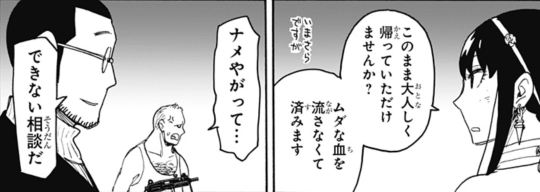
Even at times when using polite speech isn't warranted, like in her own thoughts, she still uses keigo regardless.
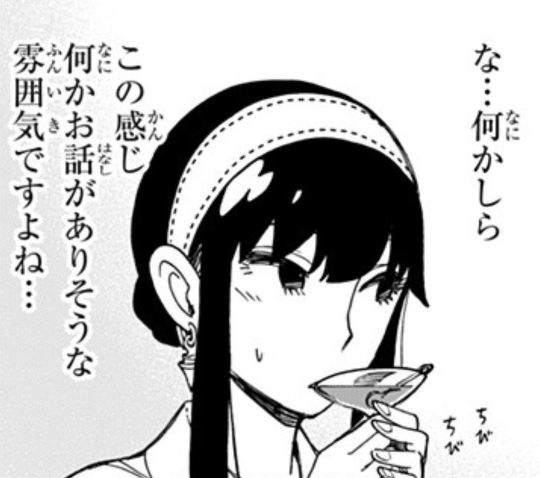
In addition to using keigo with pretty much everyone, she also uses the polite -さん (-san) honorific with everyone's names as well. It's not unusual to do this with fellow adults like Loid, Camilla, and Franky, but when it comes to kids, especially when they're not your own kids, other honorifics are also an option. For example, adults can use the honorifics -ちゃん (-chan) for little girls and -くん (-kun) for little boys, both of which denote endearment to someone young/cute. Loid calls Damian "Damian-kun" and Fiona calls Anya "Anya-chan" for example. But Yor uses "-san" for Anya, Damian, Becky, and probably every other kid she hasn't met yet! She uses "-san" with animals as well, which isn't nearly as common. She's the only one who calls Bond "Bond-san" and she even called the cat Kopi from chapter 43, "Kopi-san."
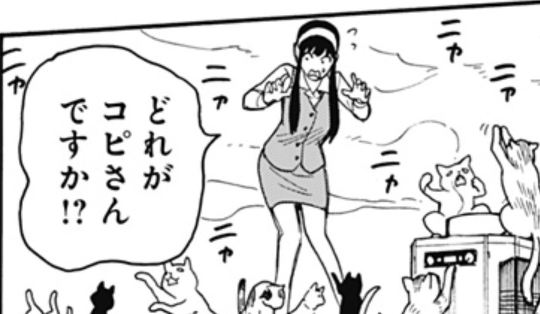
She also uses "-san" for people whose names she doesn't know, and in some cases, probably shouldn't show respect to. She calls the terrorists from the doggy crisis arc "terrorist-san", bad guys that she takes out on her missions "warumono-san," Olka's group "mafia-san," and the other assassins from the cruise arc "koroshiya-san."
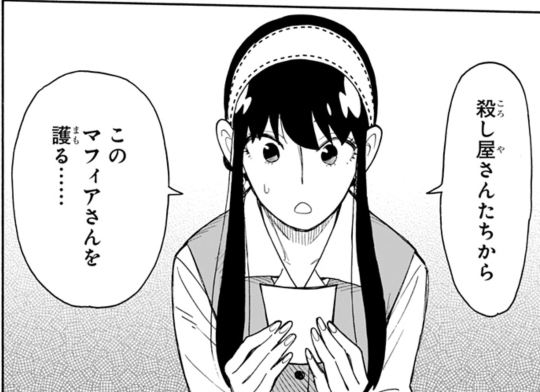
The only exception to Yor's excessive use of keigo is Yuri, which makes sense since it's standard practice to be more casual with a younger relative than an older relative or someone outside the family. He's the only person she refers to without "-san" (she just calls him "Yuri"). And while she does use the informal verb forms with him, she still uses "desu" and its conjugations. So overall, she's more casual with him, but not completely so.
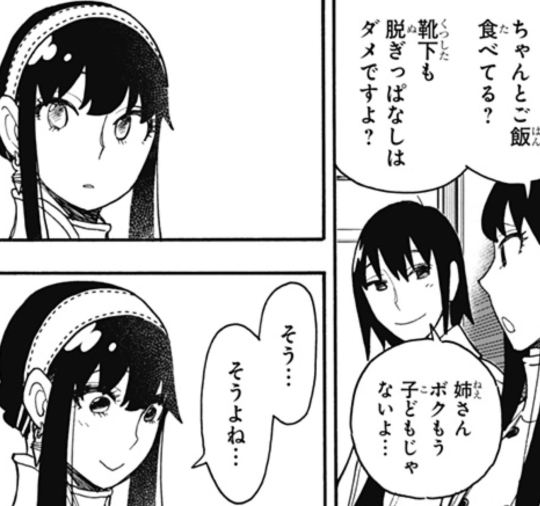
When talking about herself, Yor uses the standard, gender-neutral, polite word for "I"/"me," 私 (watashi). However, when talking to others, she never uses any form of "you." Like I mentioned in part 1 about how there's different ways of saying "I" and "me" in Japanese depending on the speech level, the same is true for "you." But it's always more polite to say someone's name or title instead of "you," and Yor does that all the time. Just like in part 2 how I couldn't recall any instance where Anya says "I" or "me" since she always refers to herself in third person, I can't recall any time Yor called someone "you" instead of saying their name or title.
While Loid uses the casual "you" word お前 (omae) when talking to Anya, Bond, Franky, and anyone else he doesn't have to be polite with, he doesn't use any form of "you" for Yor. He speaks to her the same way she does to him – saying her name plus "-san" instead of using "you."
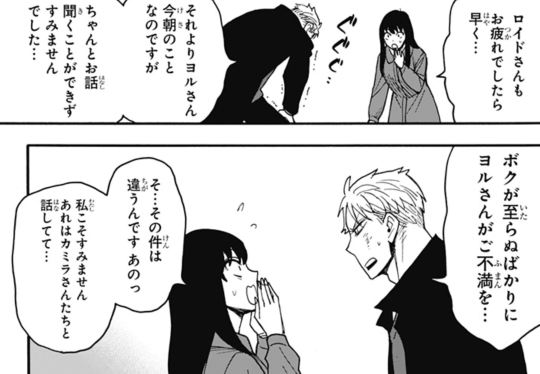
Unlike English, Japanese is a language where you don't have to say pronouns if it's understood by the context, which is why something like this is difficult to convey in a translation.
I think it's an interesting contrast that Twilight is constantly changing how he speaks depending on whether he's acting as Loid Forger, as a spy, whether he's conversing with a fellow spy like Fiona, a casual friend like Franky, someone he respects but can't be fully open with like Yor, and even how he talks to himself in his head…yet Yor is the total opposite. As I've discussed in this post, she's extremely consistent in her speech, never straying from being polite no matter who she's speaking to or whether she's in her Thorn Princess role or not, or even whether she's speaking to herself in her head or not. This just further proves that, while Yor has to keep her assassin job a secret, she doesn't have to create a fake persona for it. Unlike Twilight, who acts one way as a spy and another way as Loid Forger, and perhaps another as his "true" self, Yor doesn't feel the need to hide anything about herself other than her job as an assassin – Thorn Princess and Yor Forger are the same person who shows respect for others no matter what her relationship is with them.
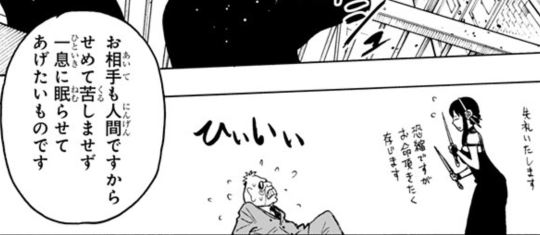
Such excessive use of keigo is odd for a fluent speaker, but it's not unheard of. There are plenty of examples of characters from other anime/manga who use keigo all the time too. I think it gives us an interesting, subtle look into their character. In Yor's case, I think her constant use of keigo comes from a combination of her sweet personality that never wants to offend anyone, but also her poor self-esteem. After all, keigo and other polite forms of Japanese speech are meant to elevate the listener while humbling the speaker. Yor speaks politely to everyone because she simply wants to be kind to everyone and make them feel comfortable, even those she has to kill, but at the same time, she often feels inferior to others.

However, there are rare exceptions where Yor stops using keigo which are, appropriately, during very suspenseful, high-stakes moments where politeness would be the least of her worries. For example, during her fight with Barnaby when she realizes she's holding back, she starts using casual speech. But she goes back to keigo before too long.
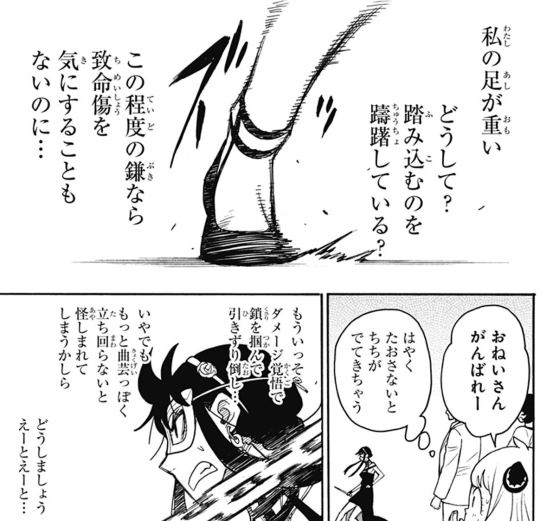
But probably the most notable example of her completely dropping keigo is near the end of her big battle against the assassins on the cruise ship, where she finally comes to realize what she's fighting for. During her whole epiphany scene – starting from when she thinks of Yuri and herself as kids until she stands up and says she won't stop fighting – she switches completely to casual speech.
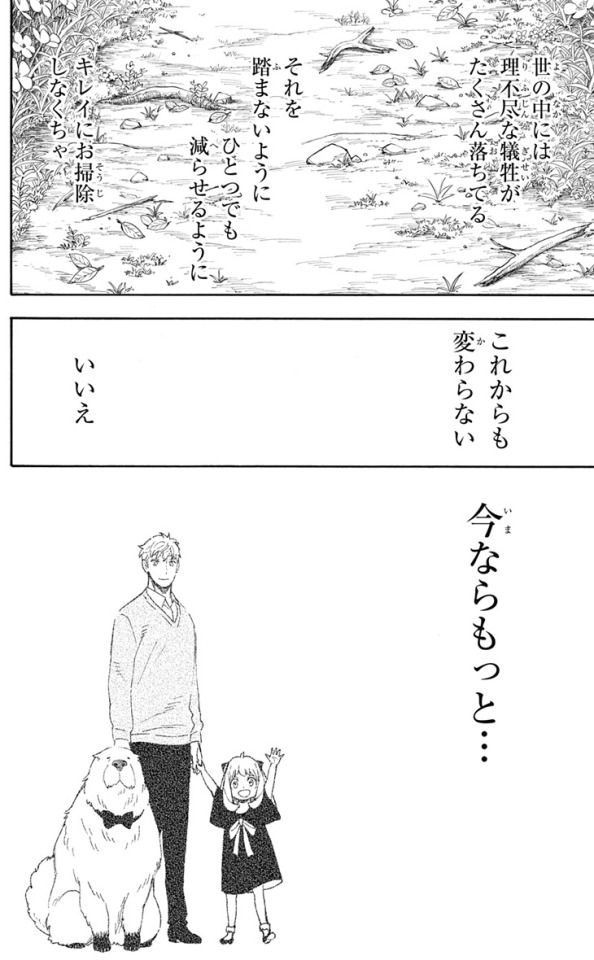
There are many ways to interpret this, but I think it shows what an emotional revelation this was for her: she remembered that the suffering in the world is what caused her to want to protect Yuri from any kind of tragedy, and now the same can be said for Loid, Anya, and Bond. She remembered the words of acceptance she heard from Loid when they first met, words no one else had likely ever said to her before. She realized that she didn't care what happened to her as long as she could stop anything bad from happening to her loved ones – in that moment, no formalities were necessary with such intense self-reflection.
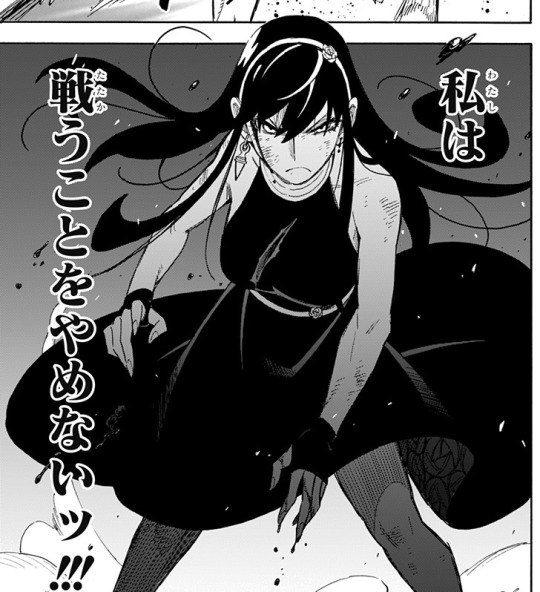
Continue to Part 4 ->
<- Return to Part 2
#sxf#spy x family#spy family#spyxfamily#loid forger#yor forger#anya forger#twiyor#sxf manga#sxf analysis#sxf manga spoilers#sxf meta
447 notes
·
View notes
Note
the one thing i don't understand is why the nazis fetishizers don't just find a movie or a band or a tv show to obsess over like normal people or make some ocs to fill that void. literally anything other than making thirst posts who people who were more than likely responsible for the suffering of your ancestors and would have killed your ass for not being a pure aryan german if they were still around today.
Iunno people can't really "pick" their interests, this goes double for mental disorders like autism where you can't pick your special interests/hyperfixations. I personally don't much care for the phrase "like normal people" cuz "normal" is extremely subjective and often incredibly ableist. "Why can't you be normal" can be said for anything, any behaviour or any "weird" interest. Autistic kid like trains a bit too much? "God why can't you just have a normal interest that's socially acceptable, like a band or something, and not talk about fucking trains all the time. Why do you have to be autistic, why can't you mask and act normal to meet my standards of what normal is."
My issue isn't with their interest. I know quite a bit about Third Reich-era Germany and about WW2 because it was also a hyperfixation of mine for a long time—see my previous posts for why, but it boils down to "those who don't know history are doomed to repeat it". I'm a history nerd, and WW2 has played a VERY large role in our recent history and the after effects still echo today. And those who don't know their history are doomed to repeat it.
The issue I take is with them romanticising these people. That's where "interest" crosses into "idolisation", which is when you start having problems and start making excuses for the things they've done. That's what breeds white supremacists and makes these people seek out neo-Nazis, and that's what the actual problem is here. If Reichblr was just people geeking out over history and exchanging historical theories or discussing events or something, I wouldn't have an issue with it. What I have an issue with is people woobifying war criminals into kawaii-desu anime boys.
13 notes
·
View notes